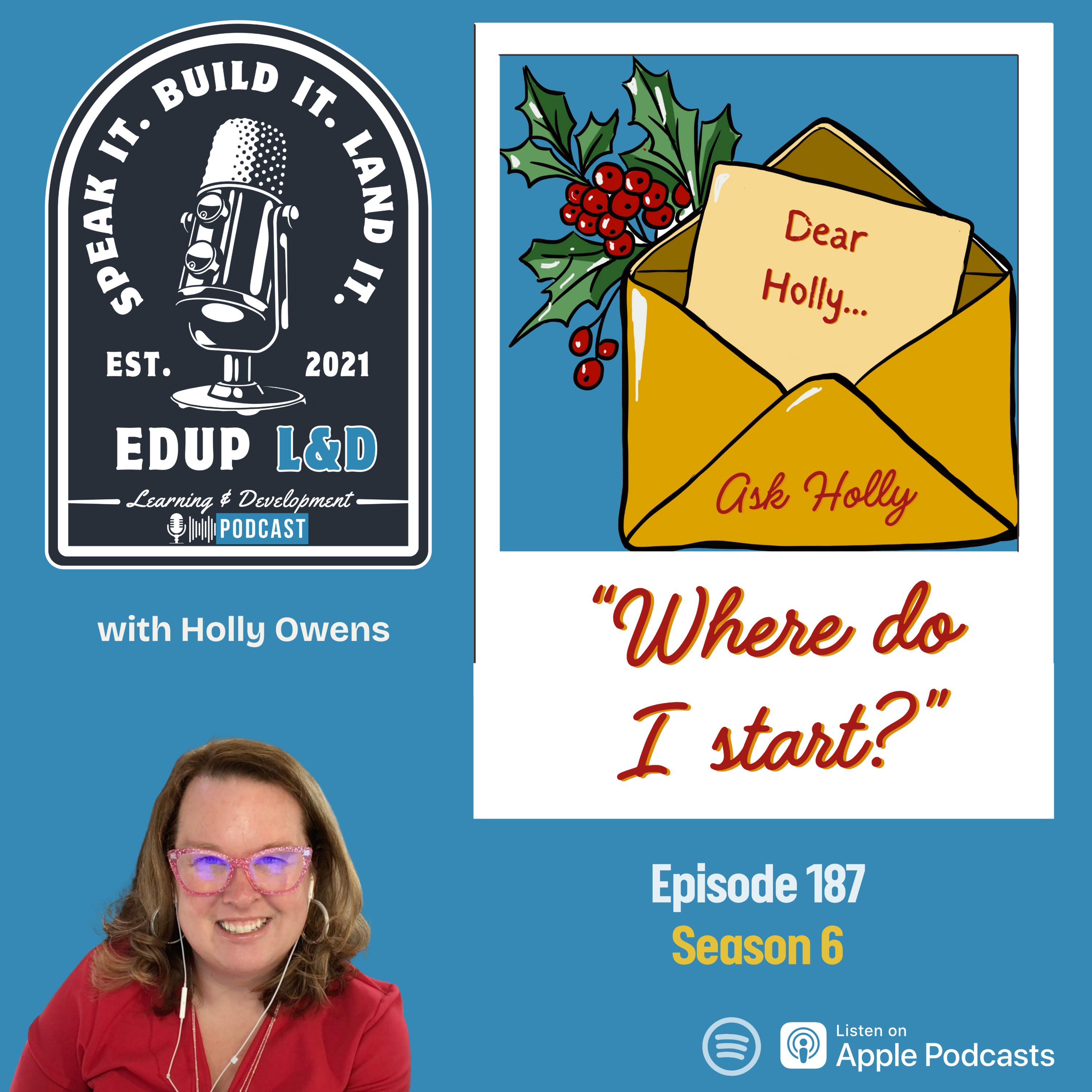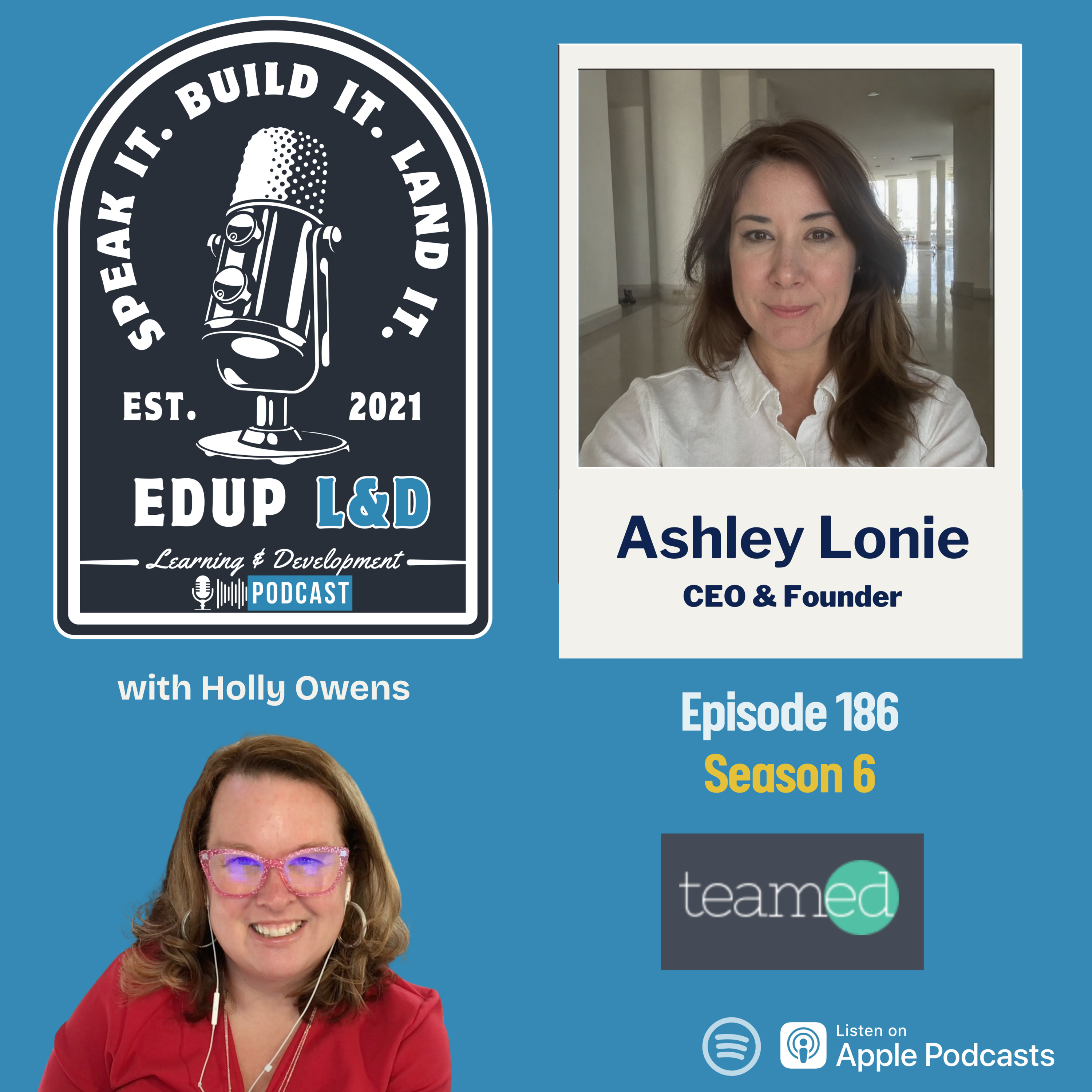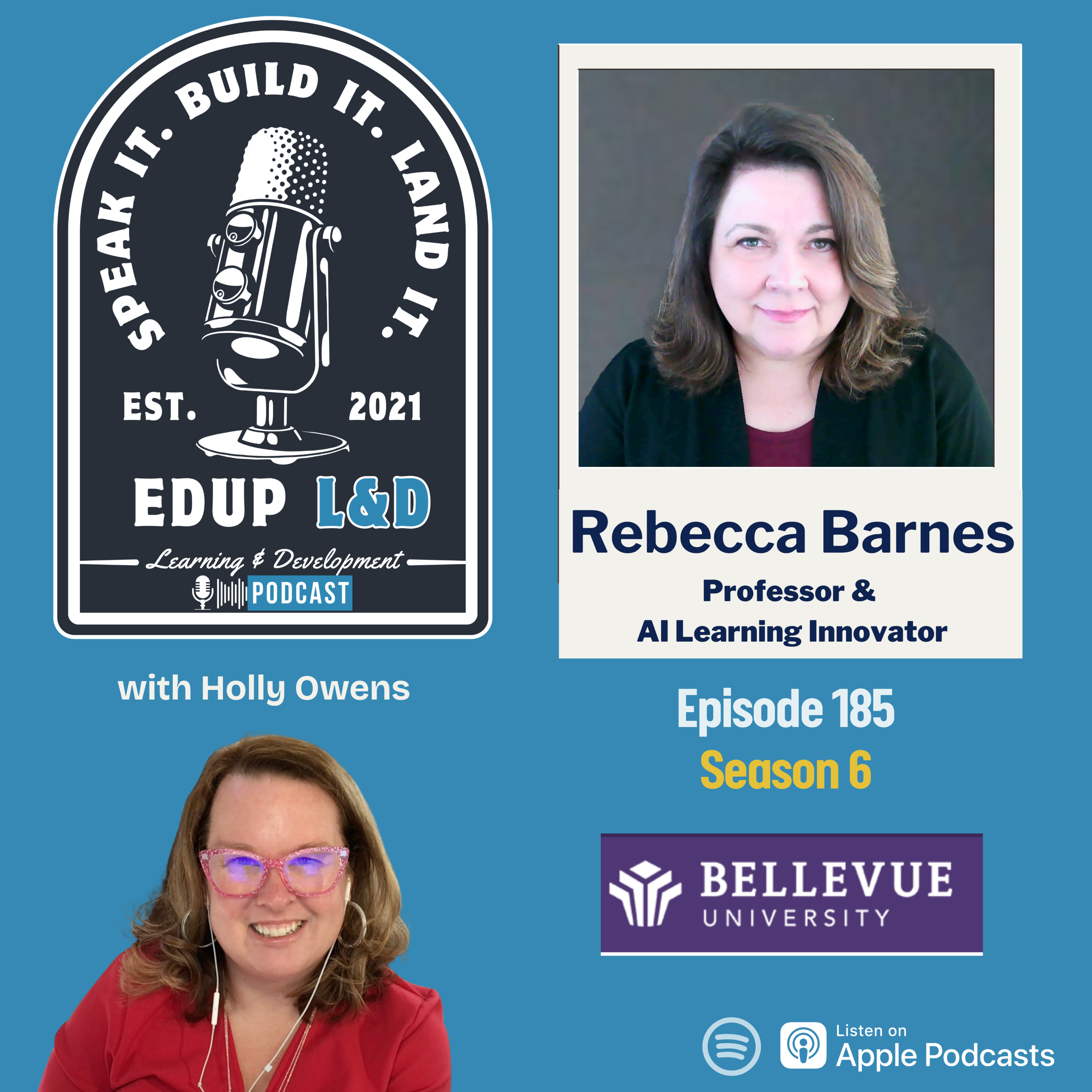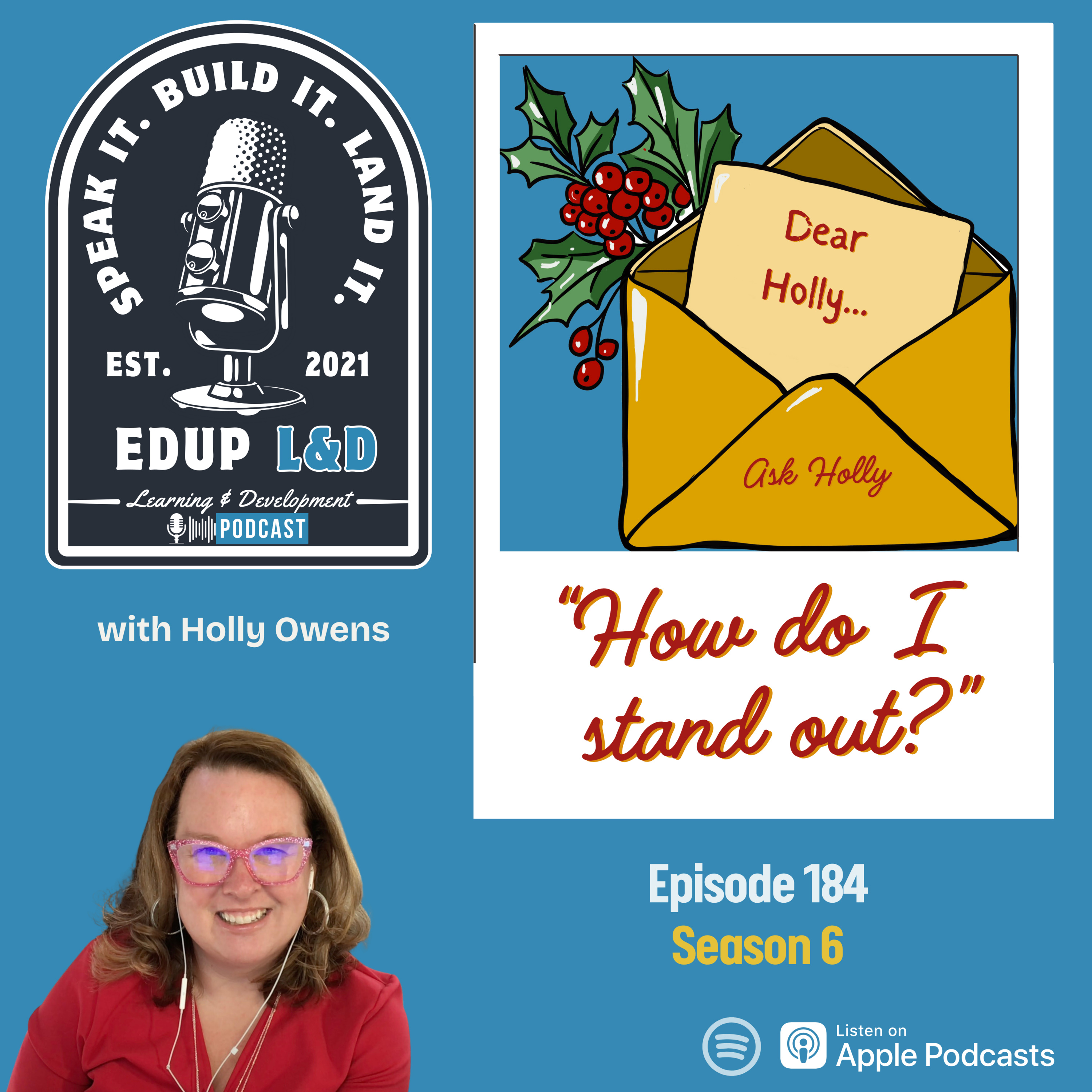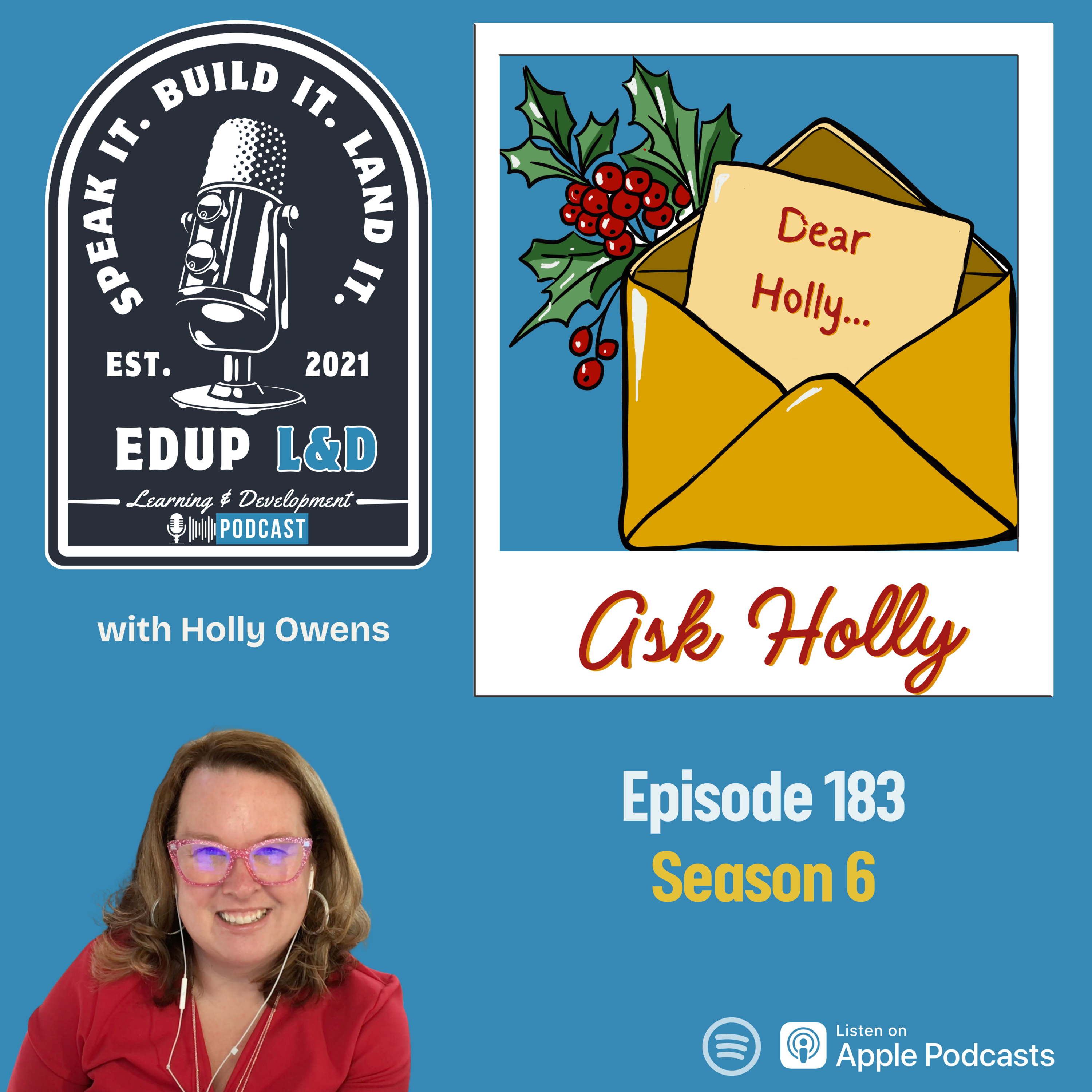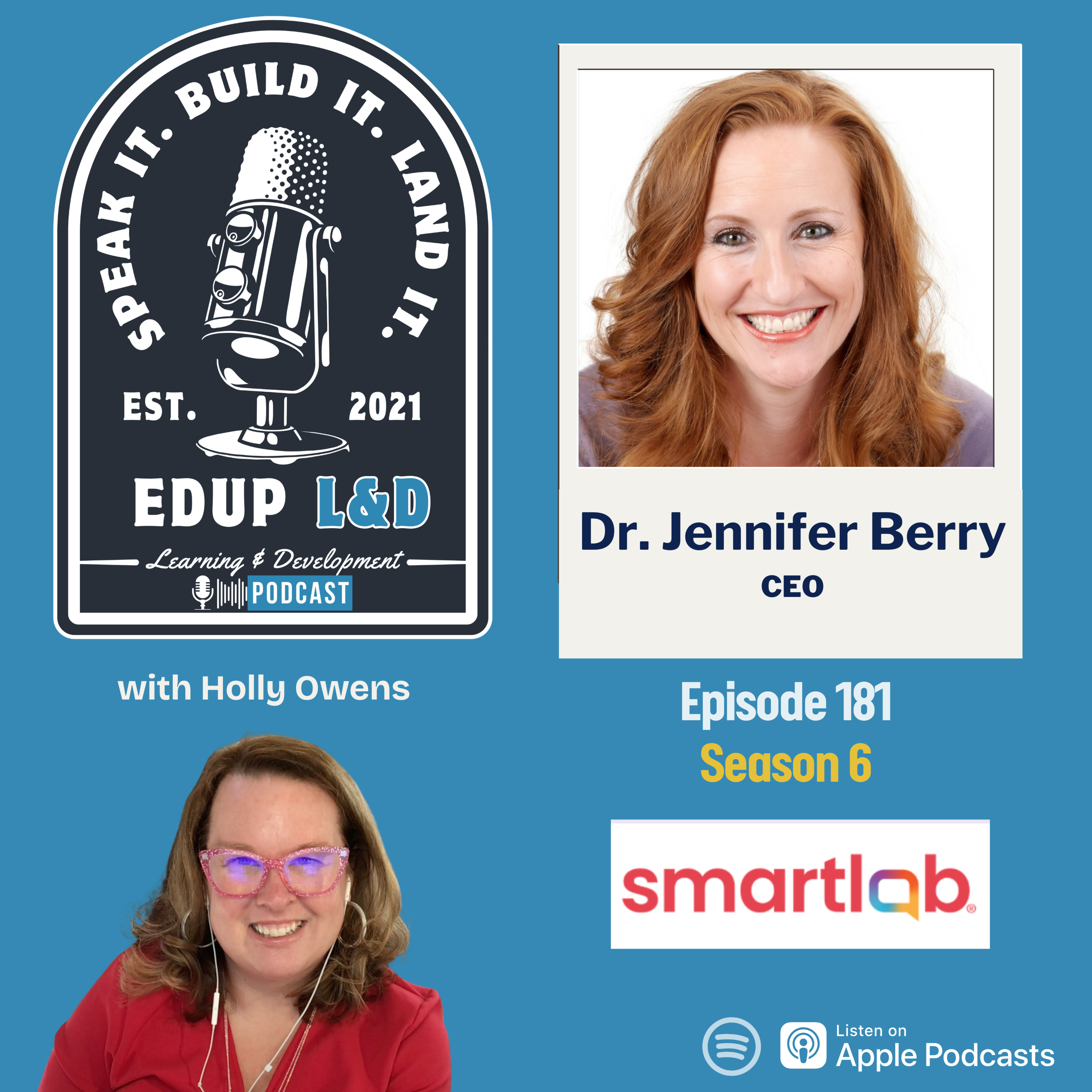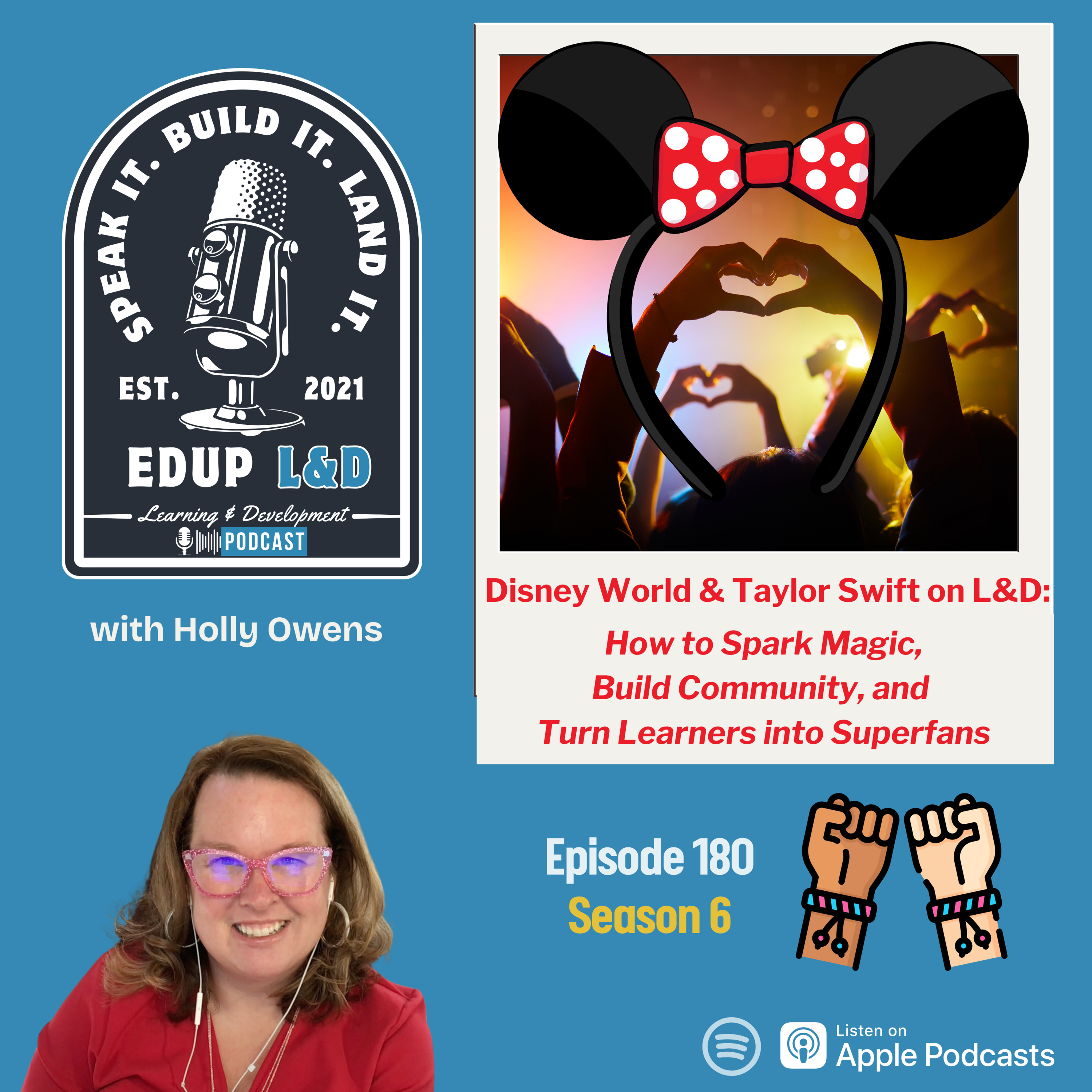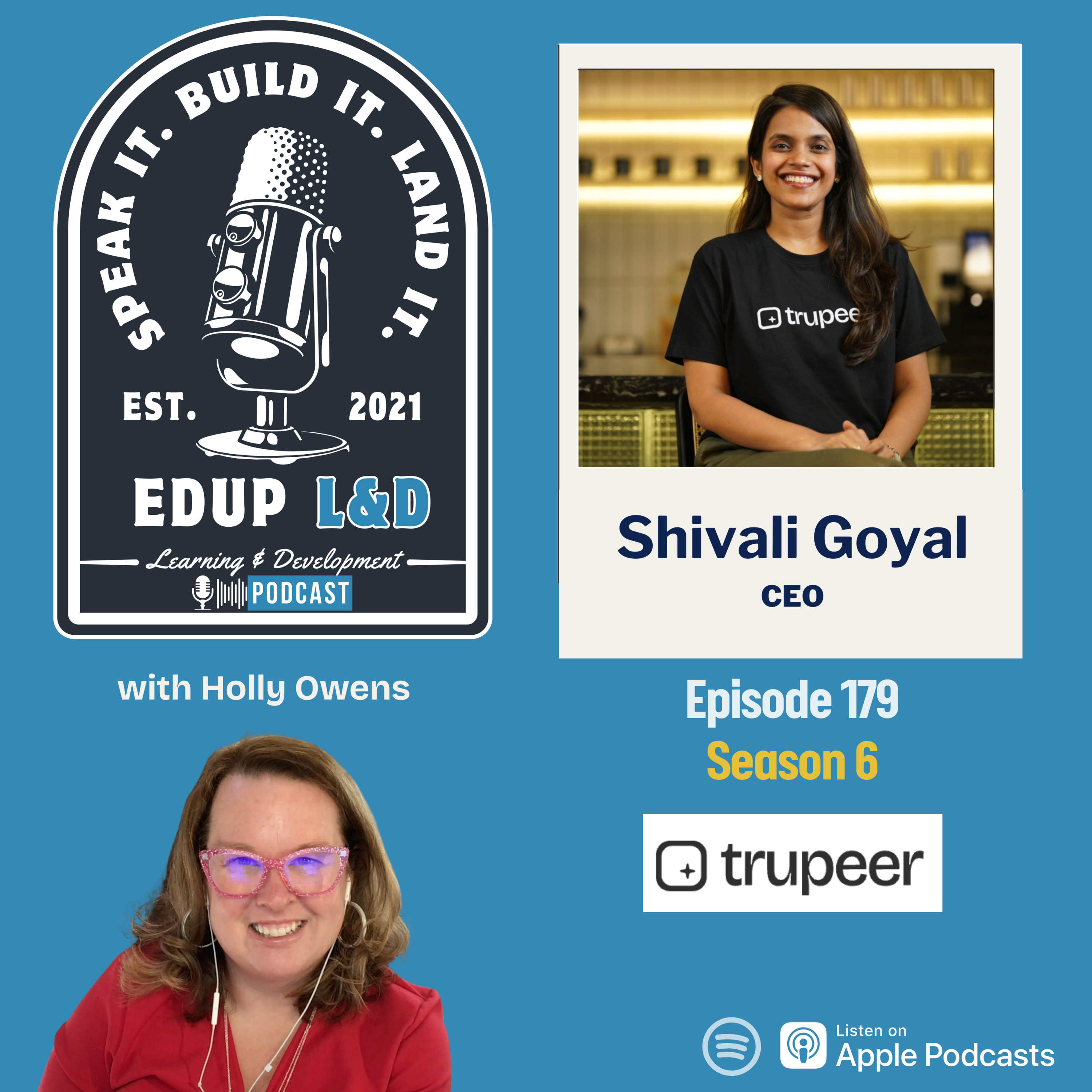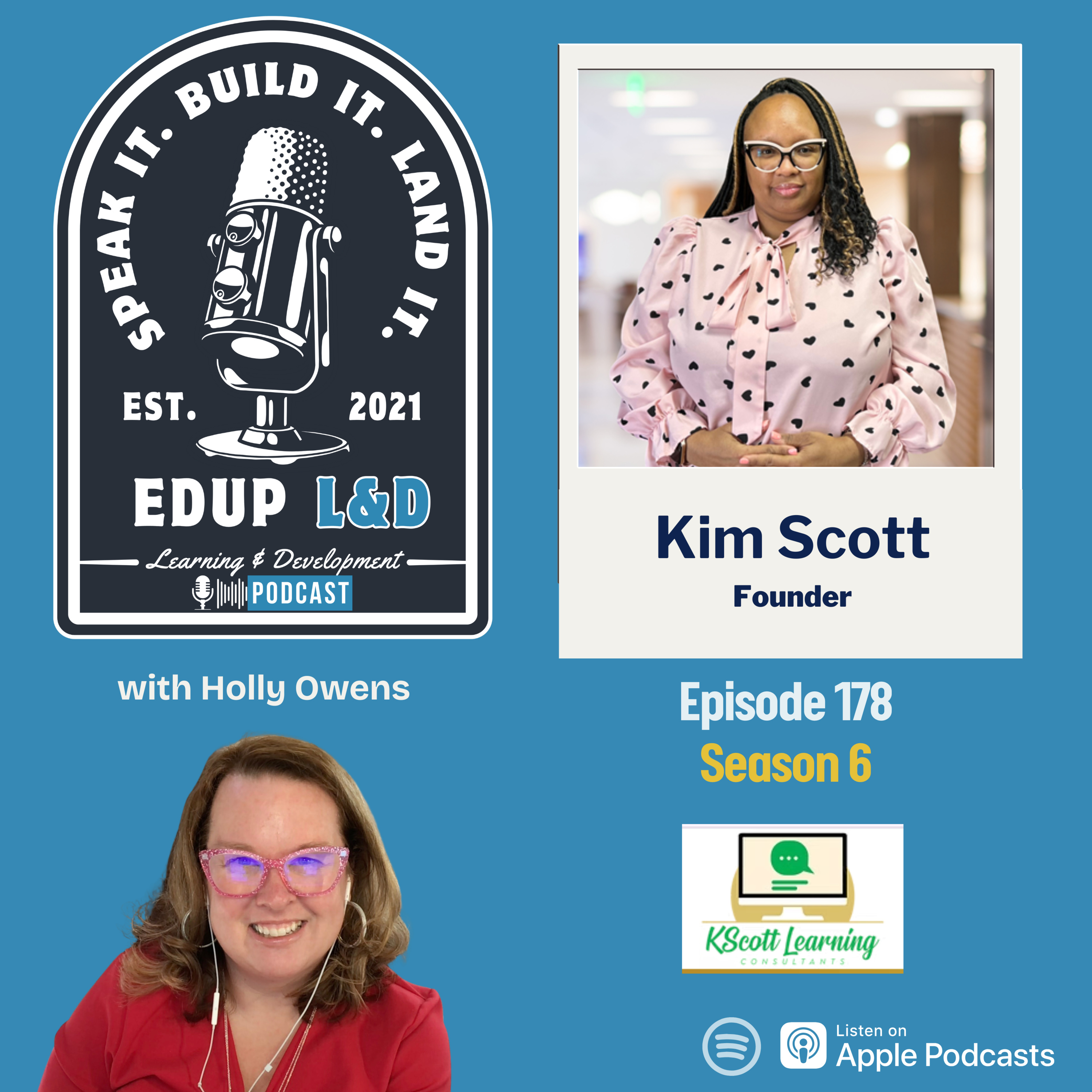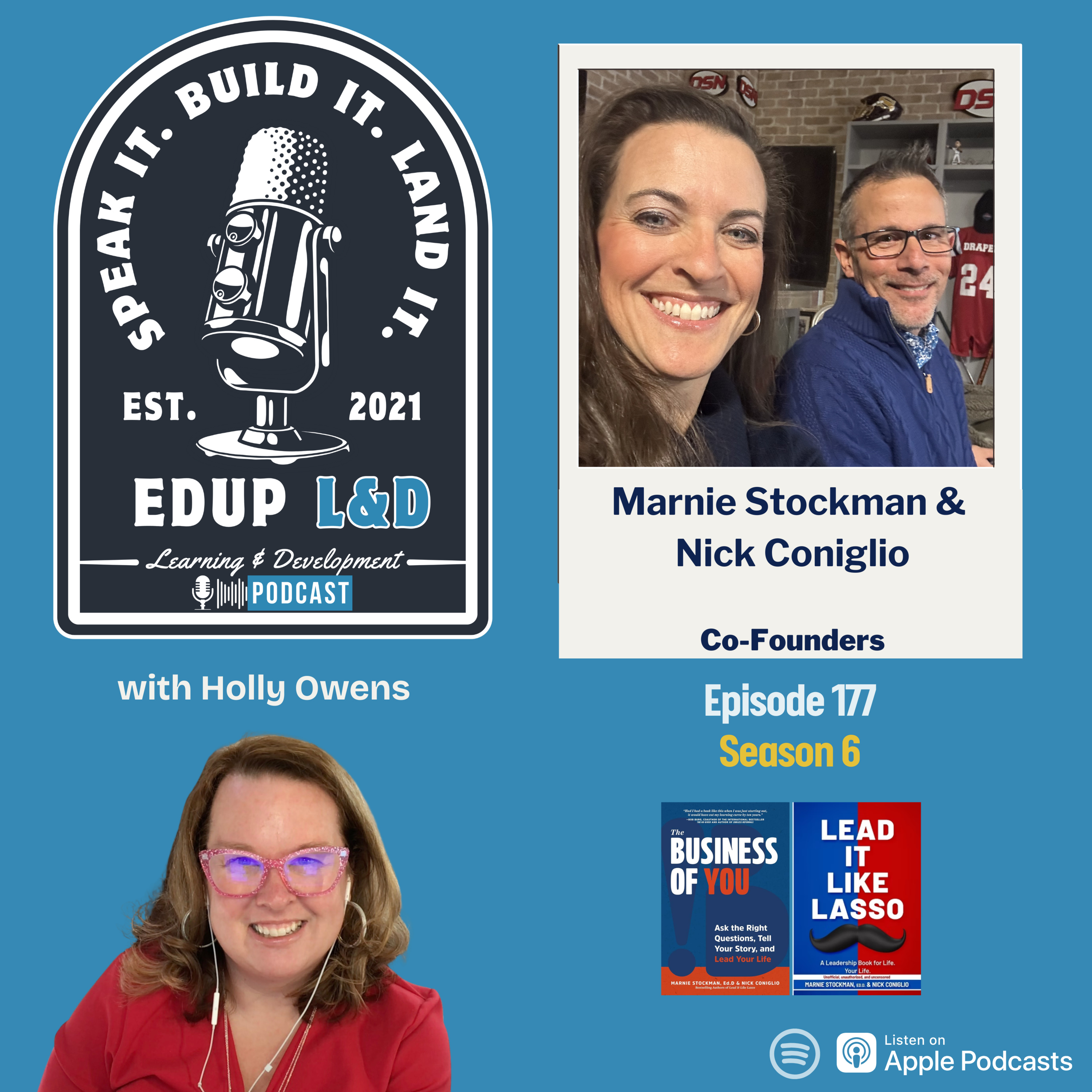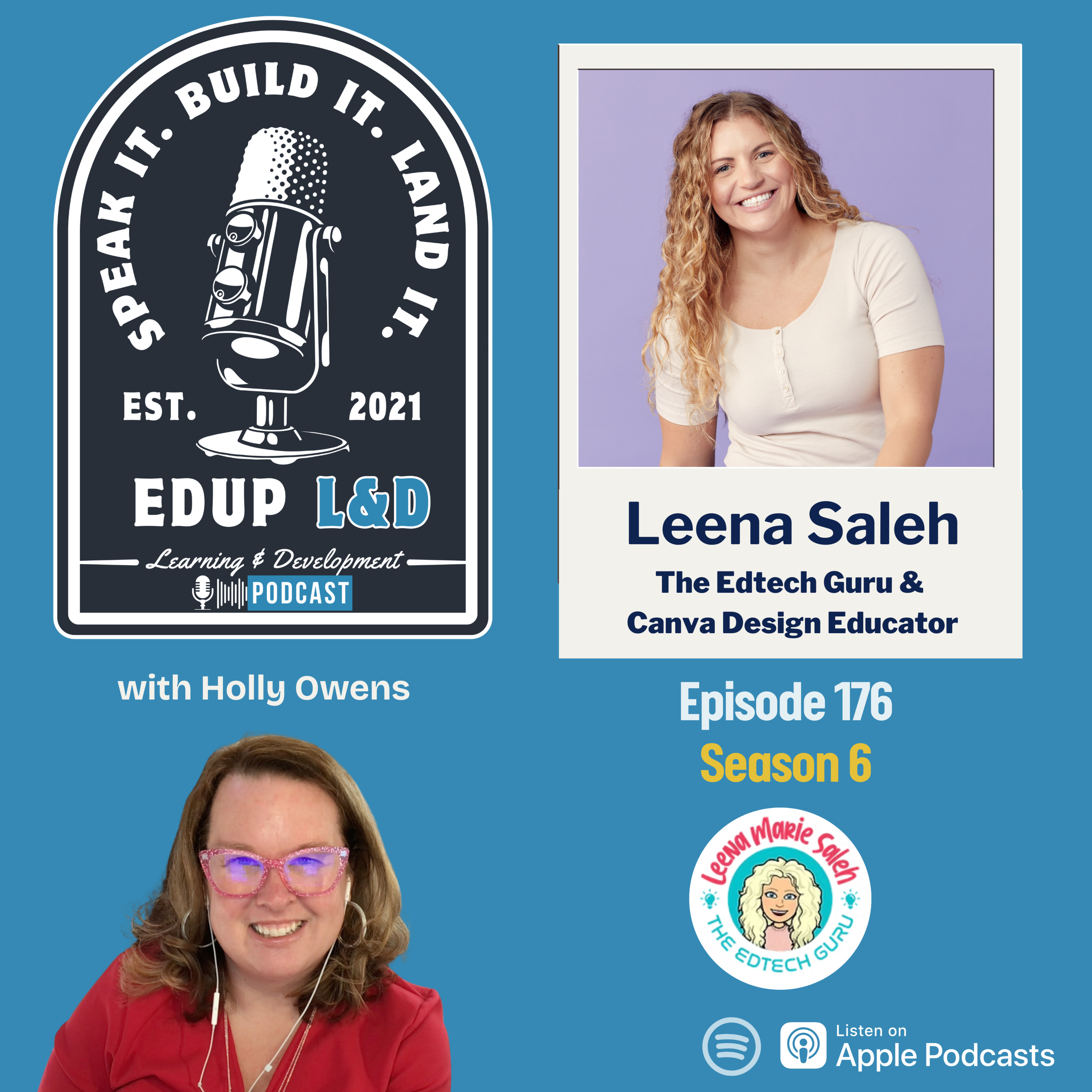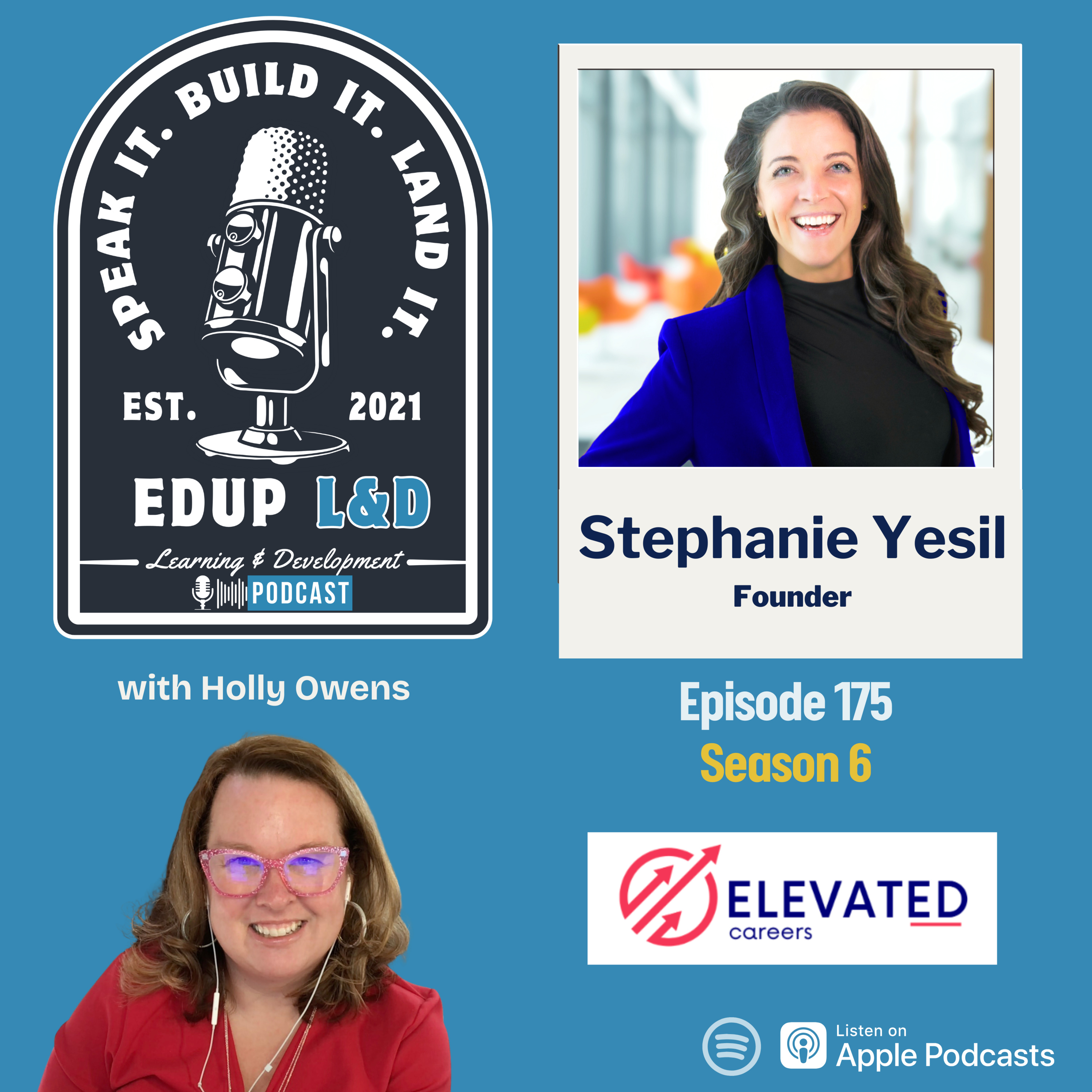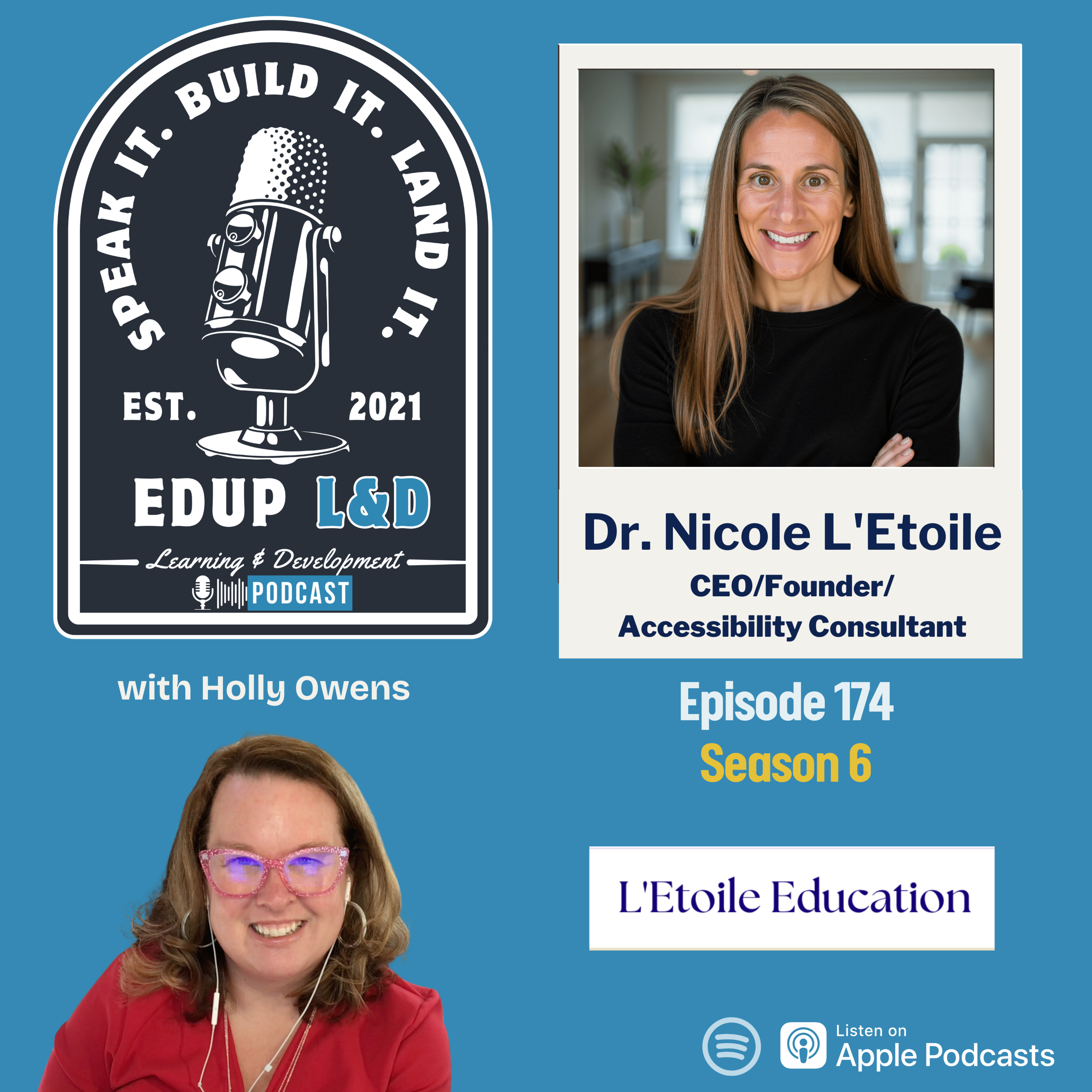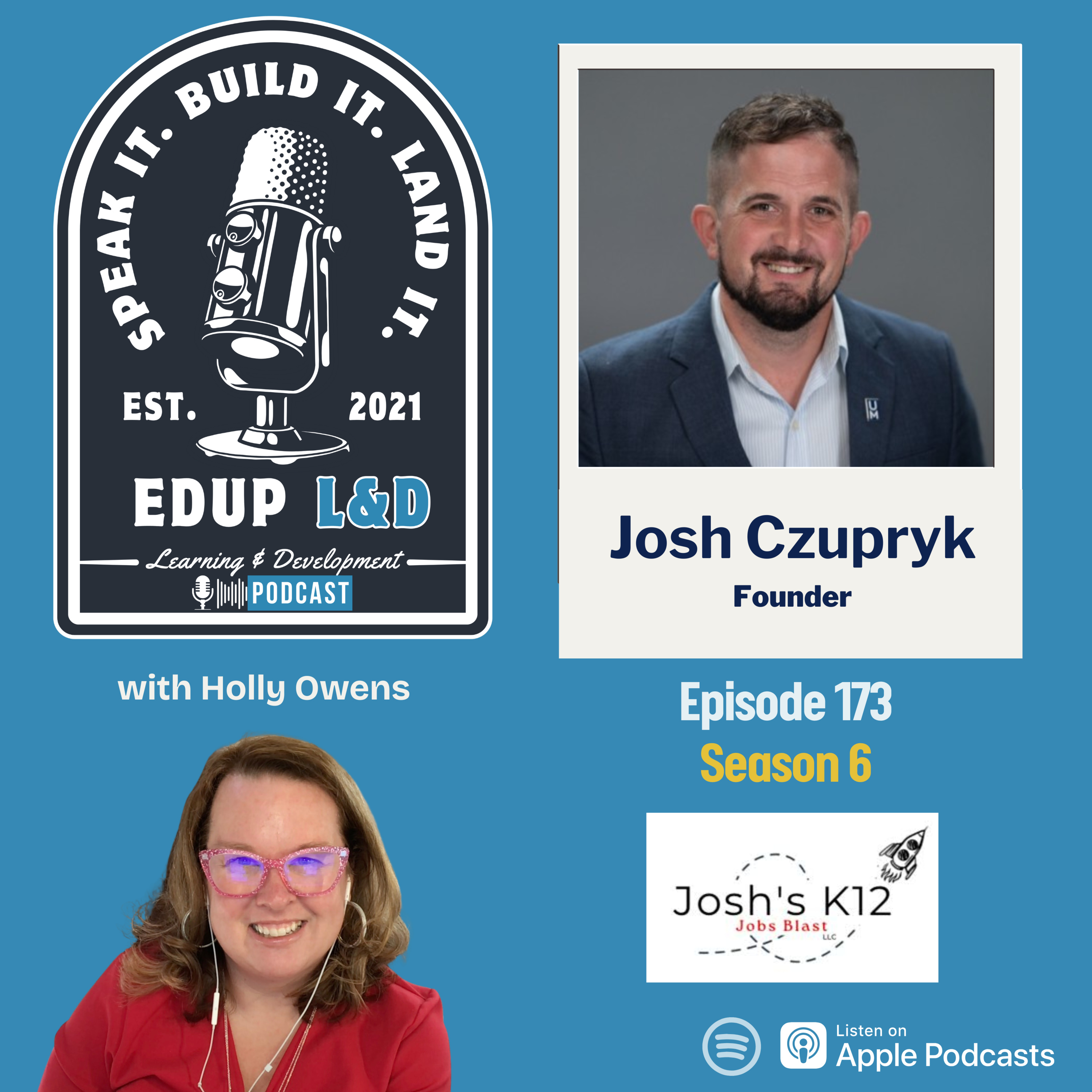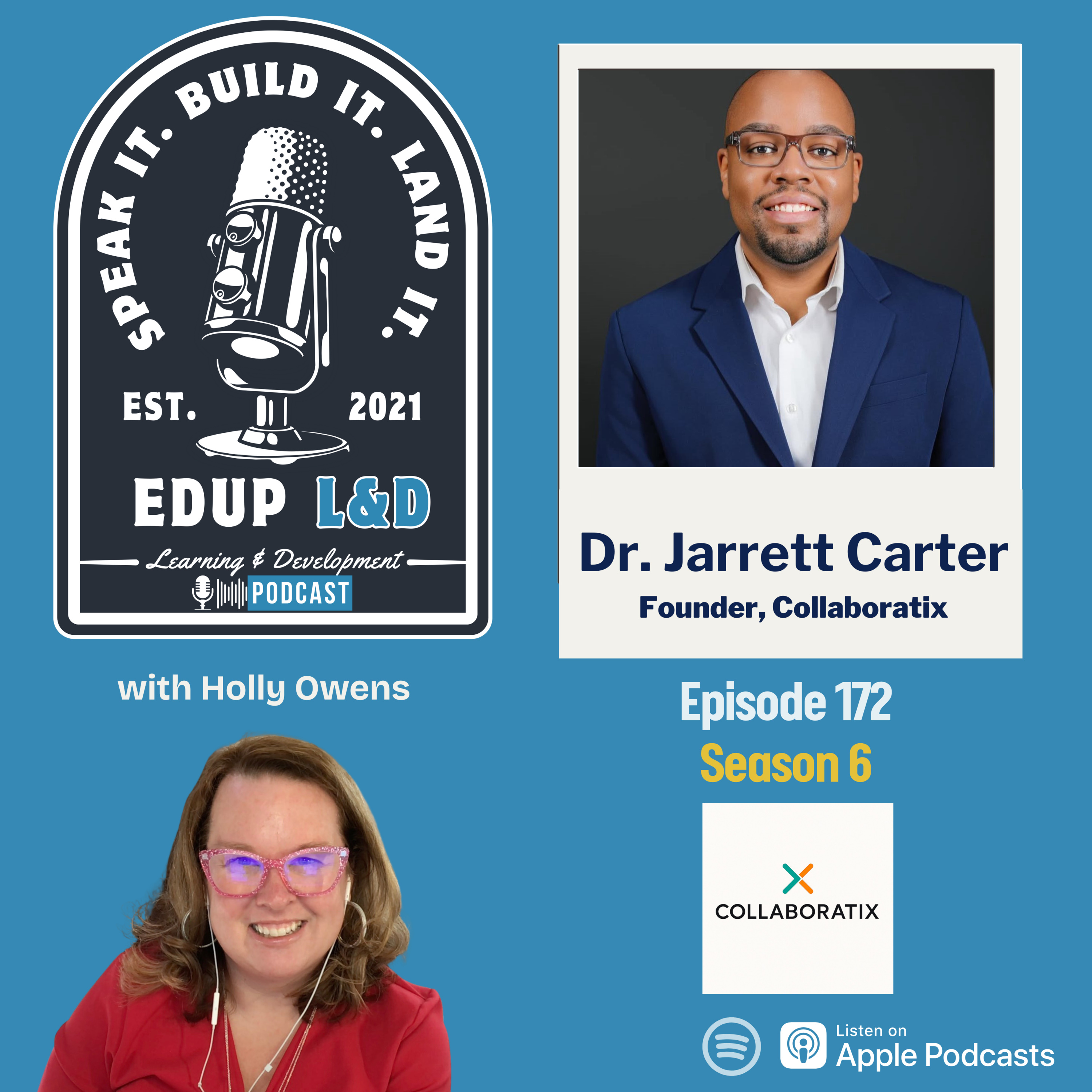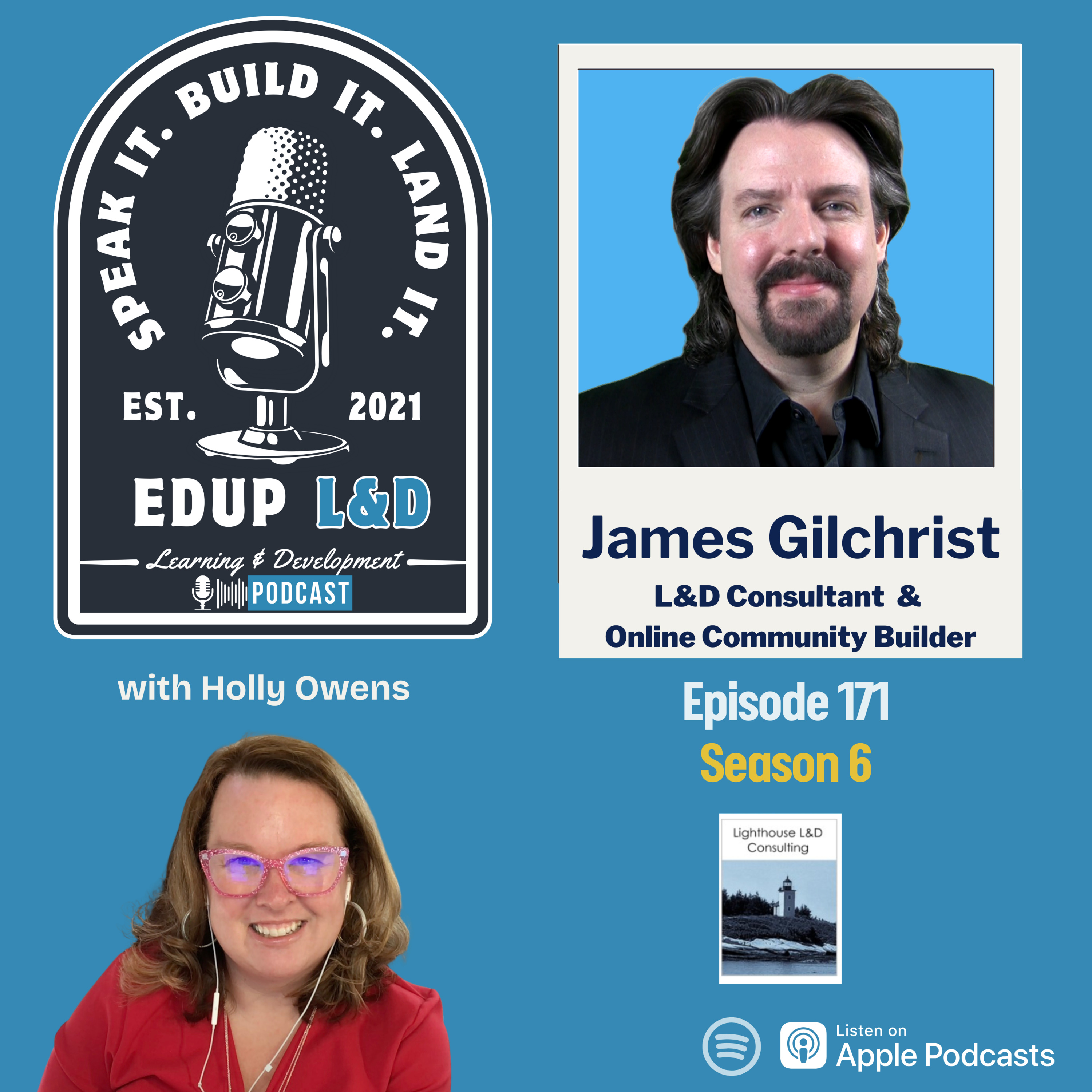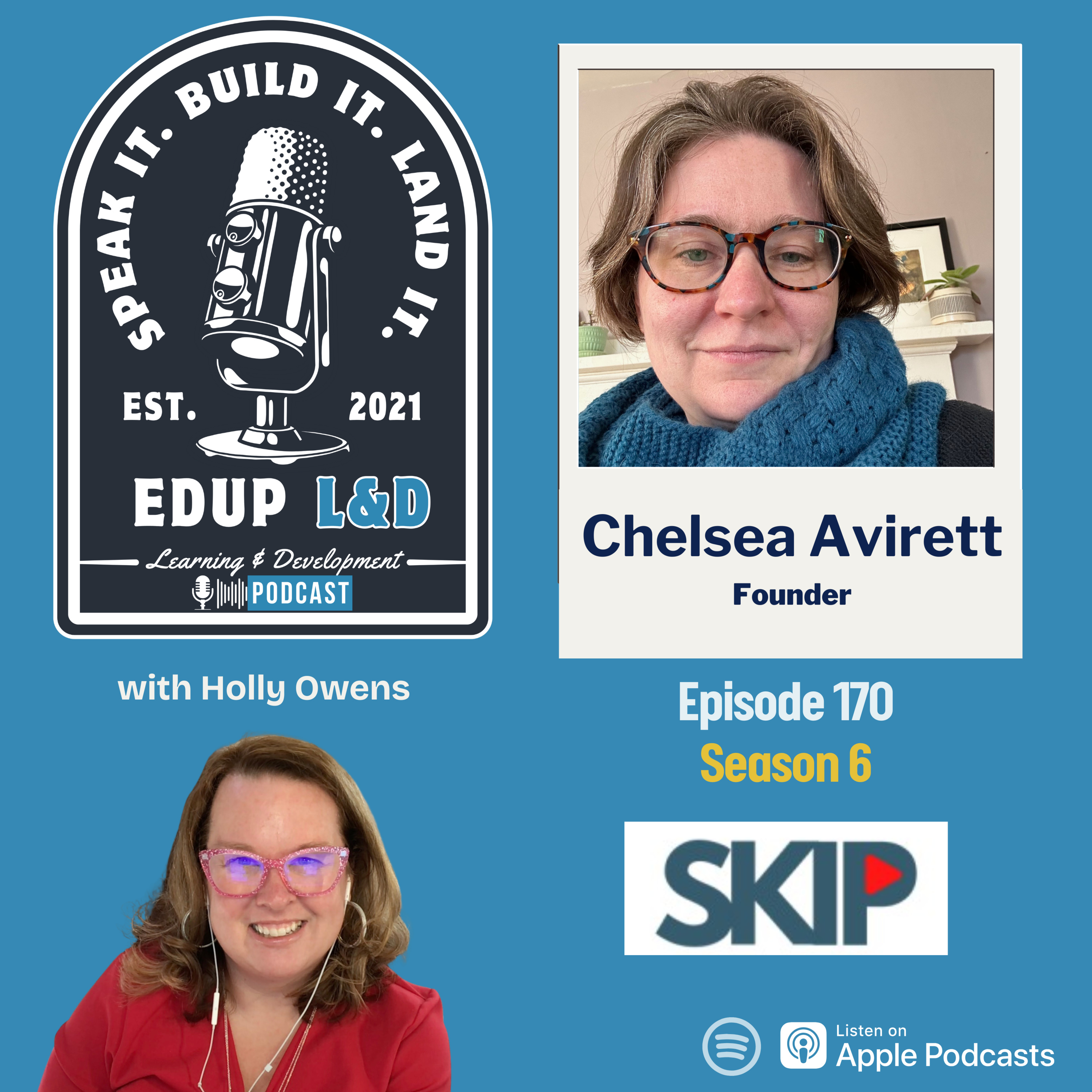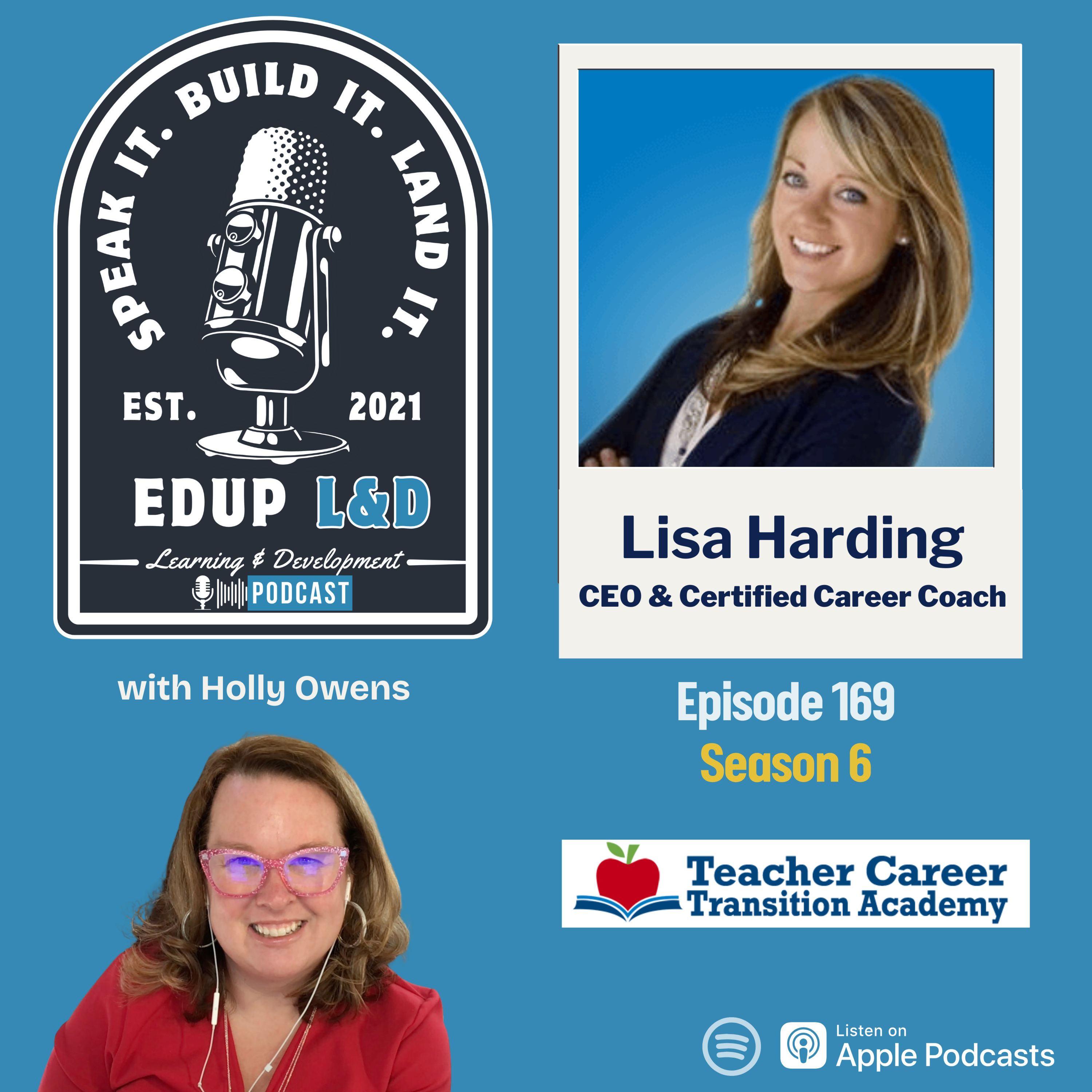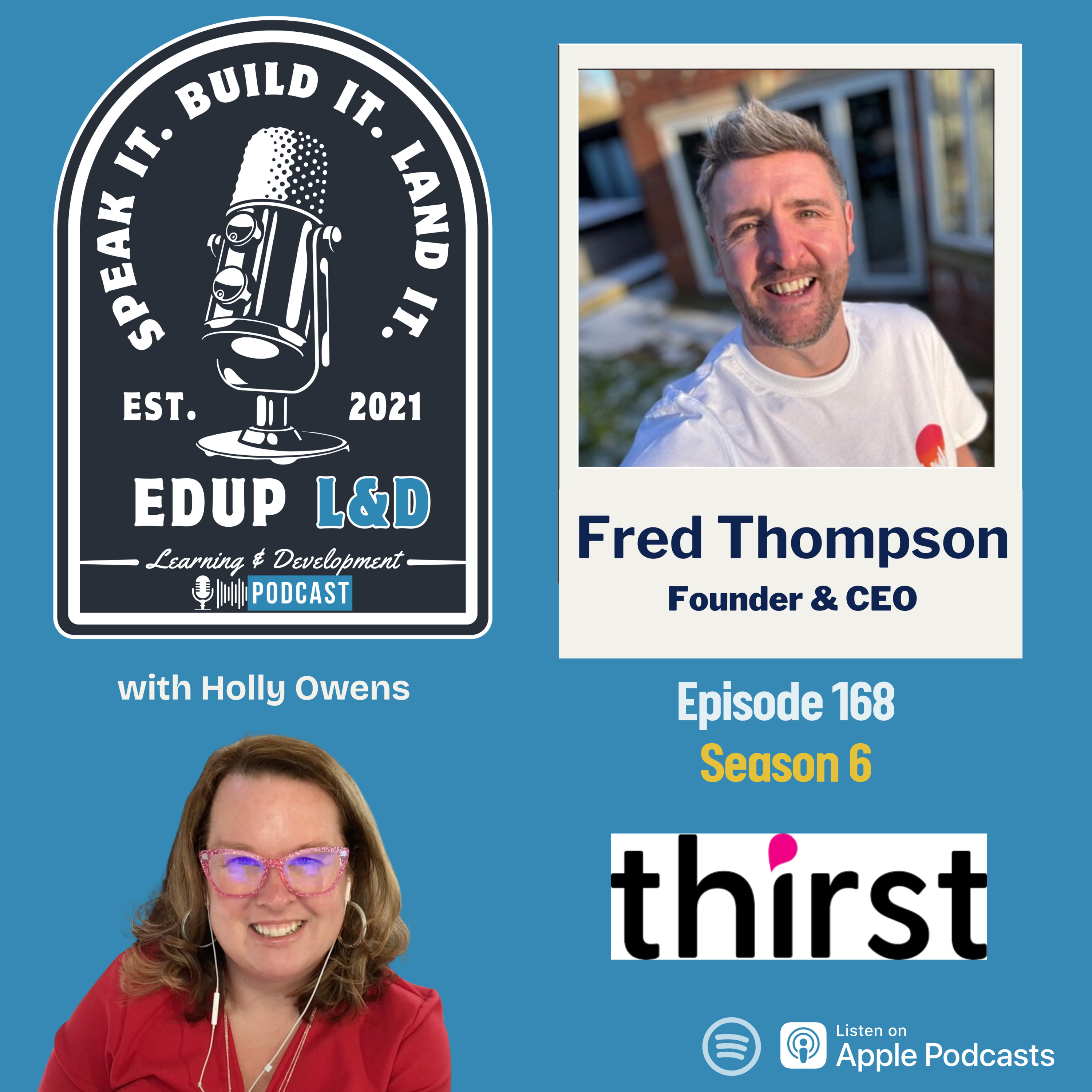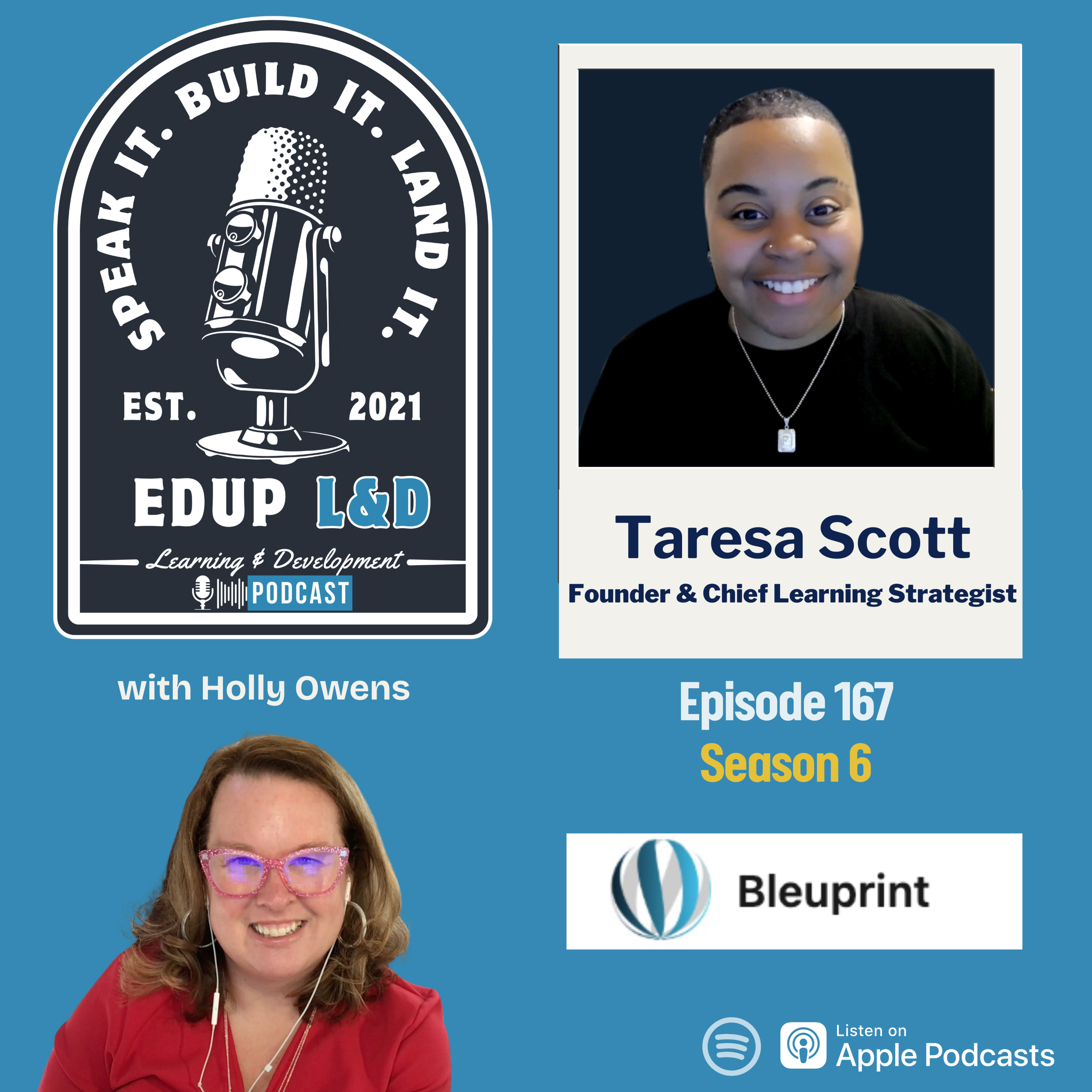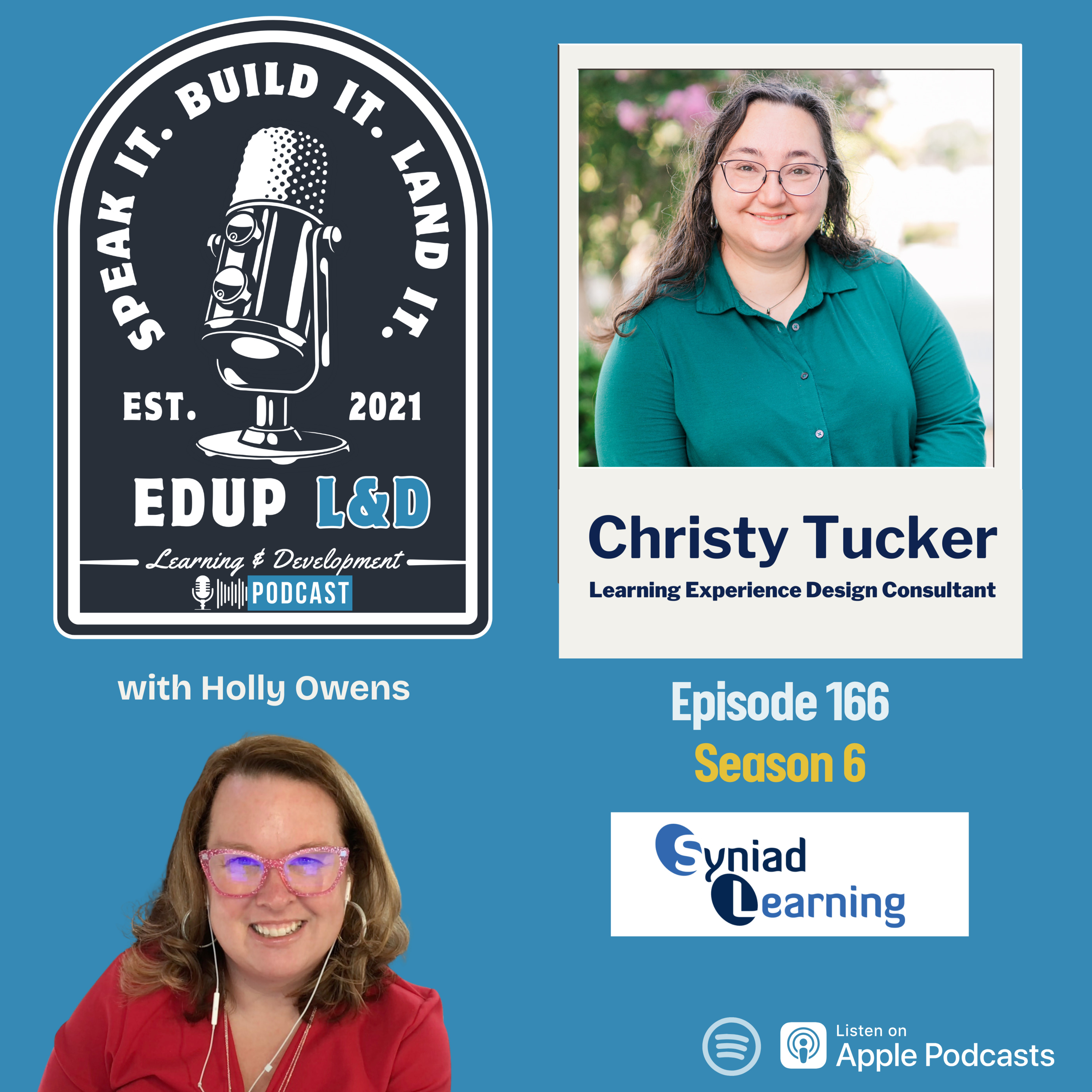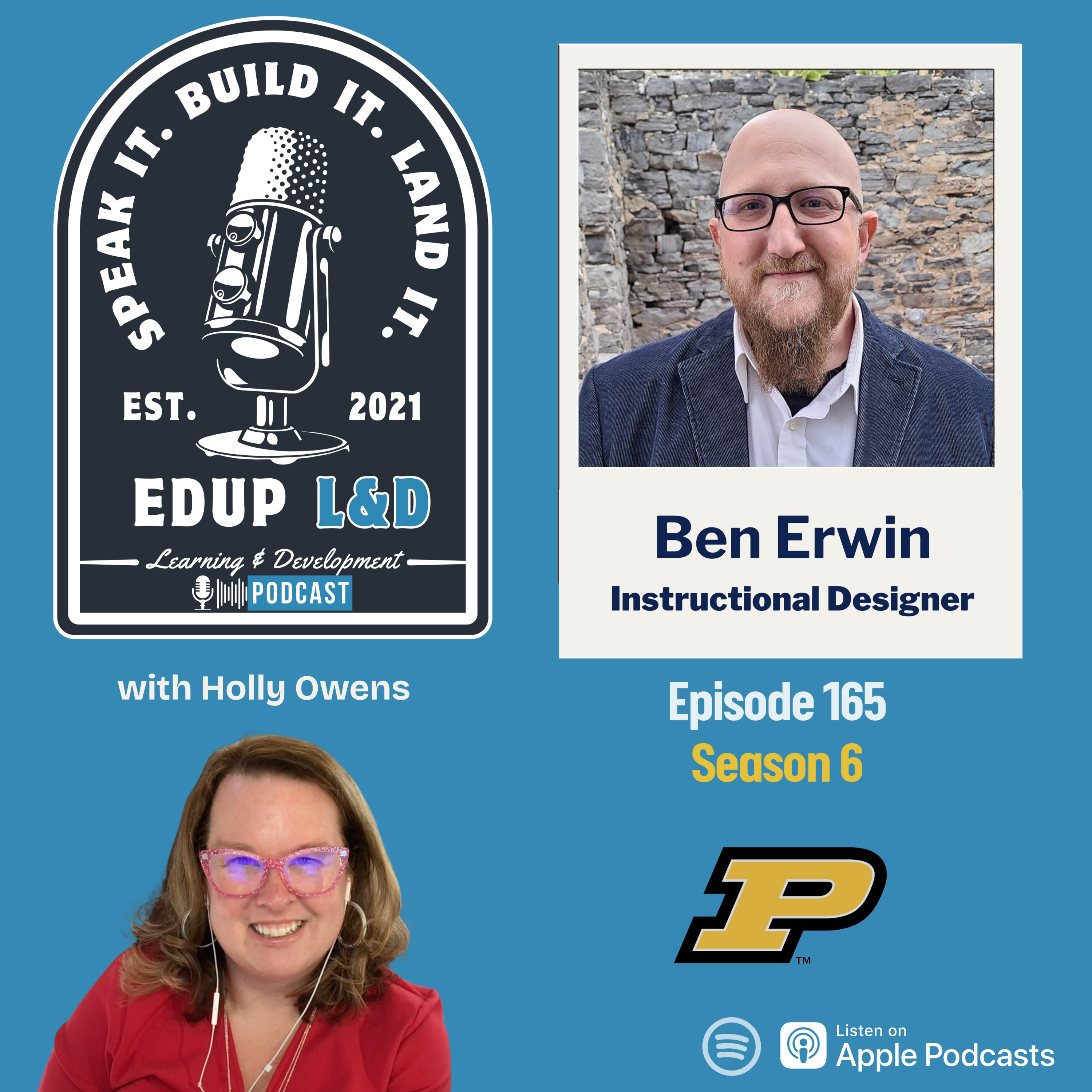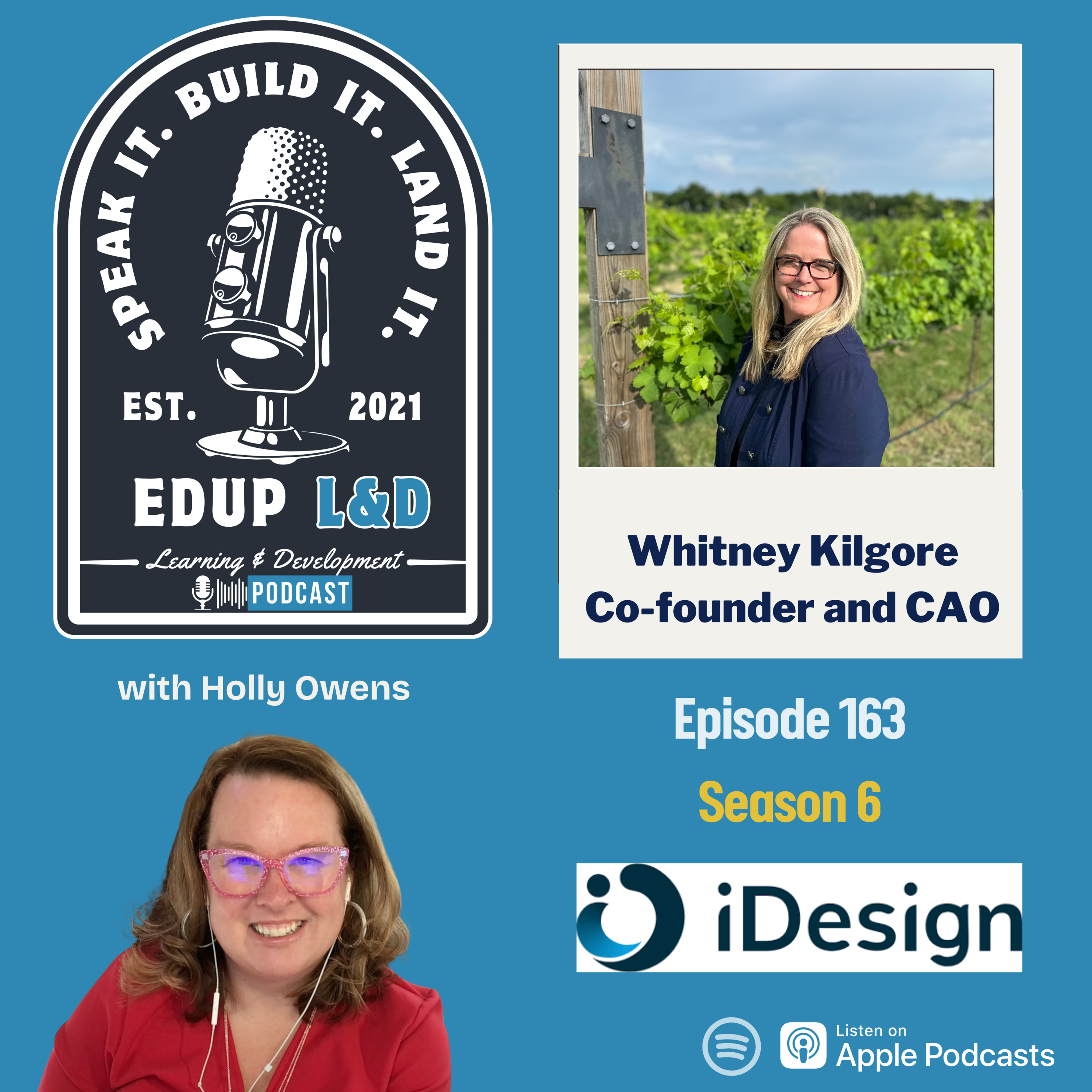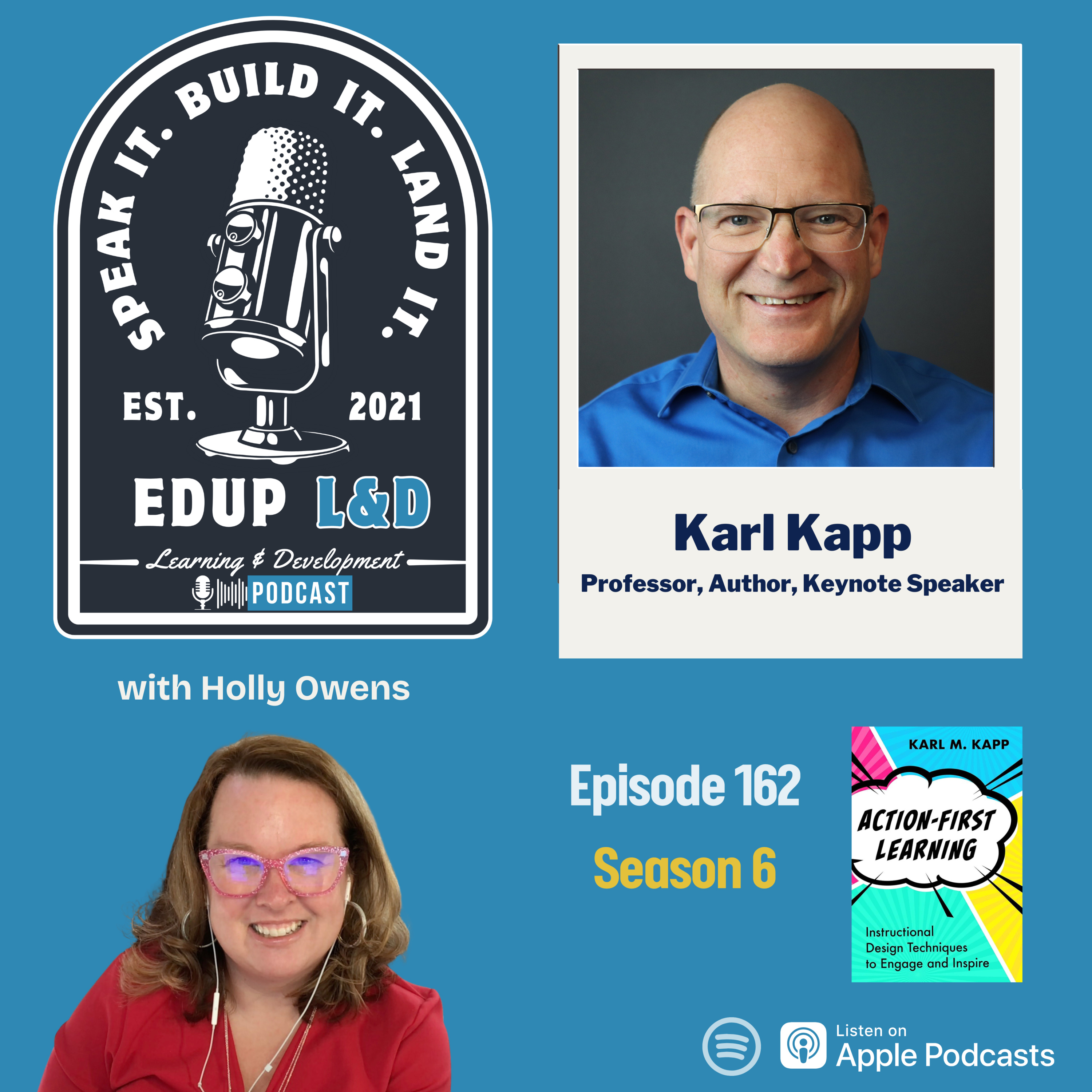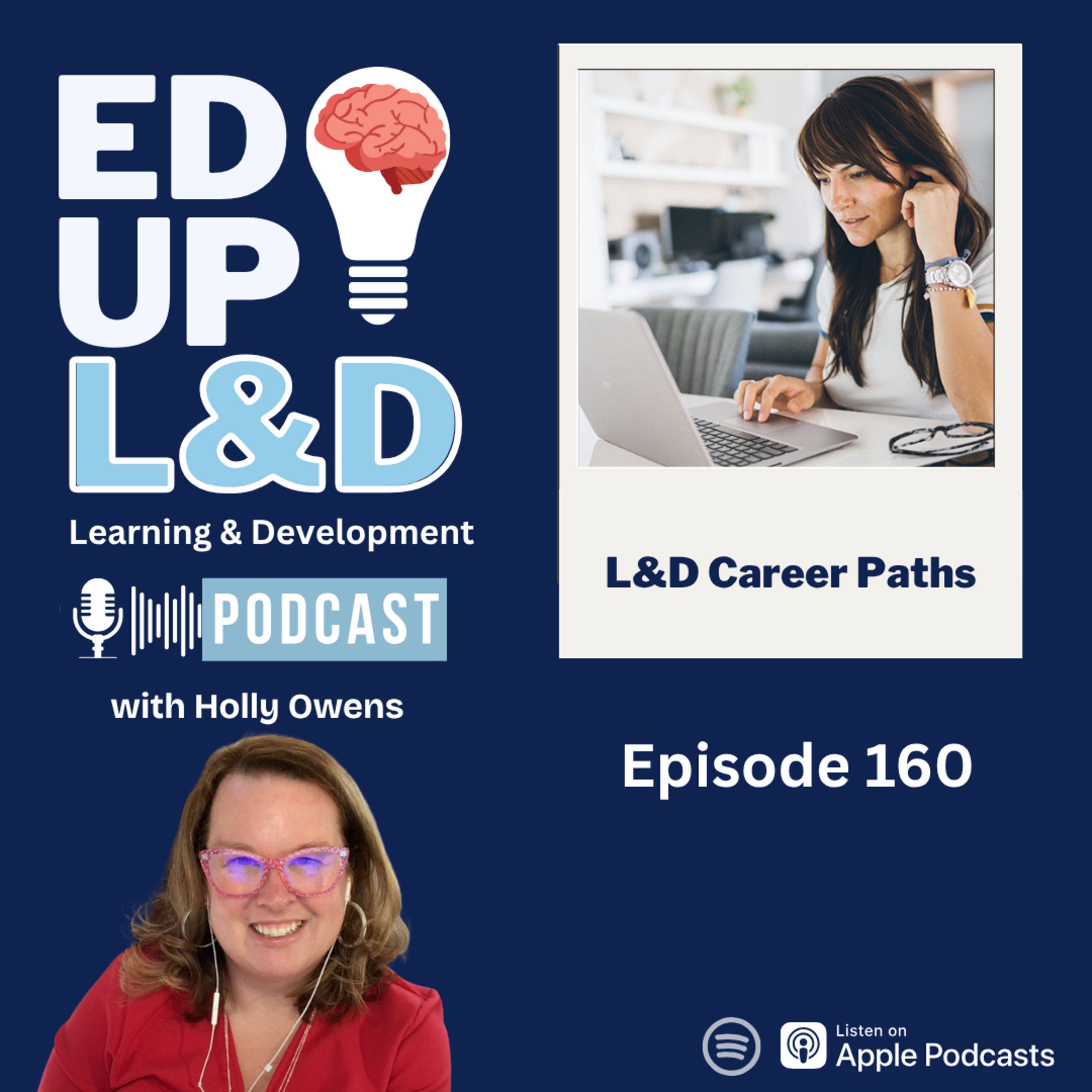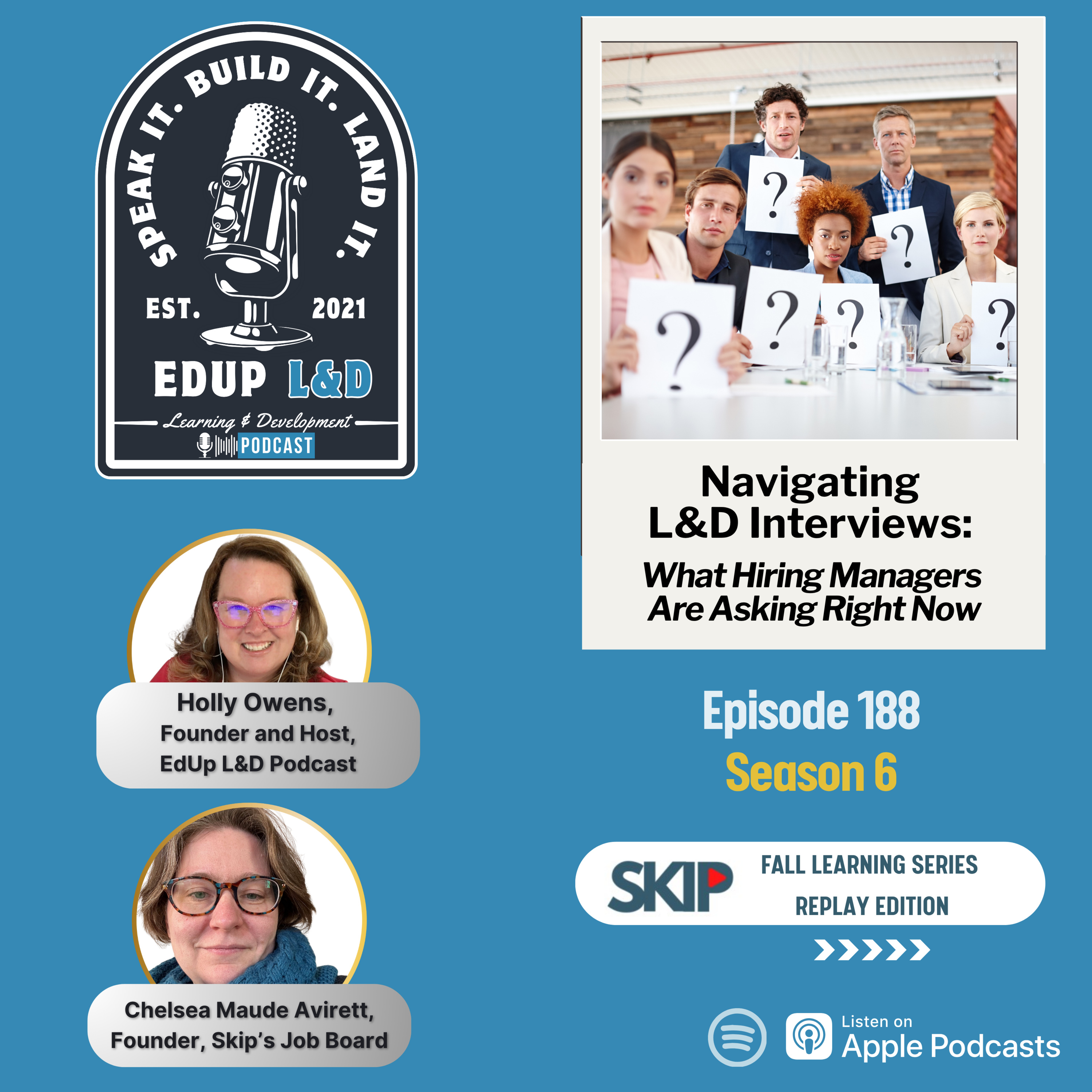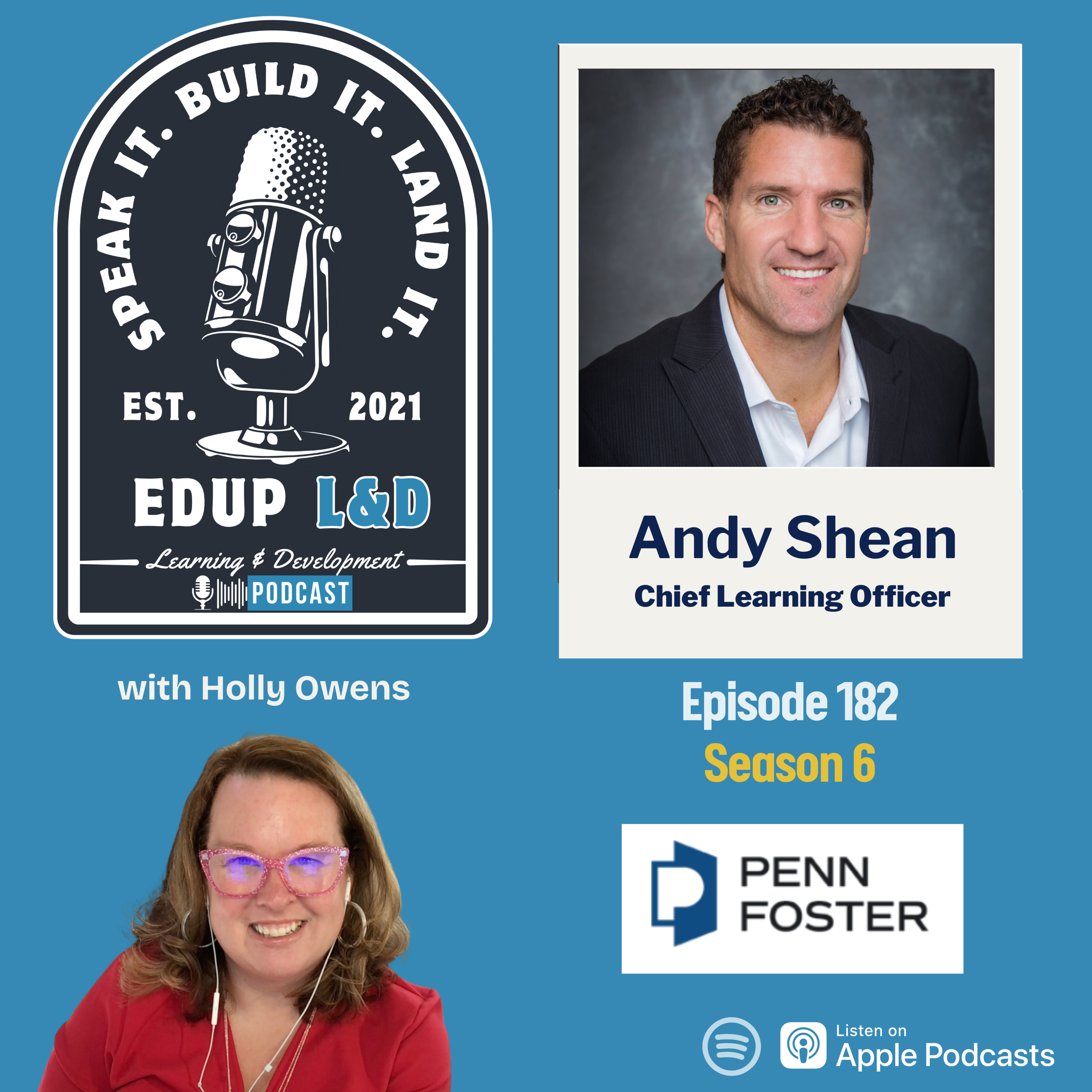
In this episode of EdUp L&D, Holly Owens interviews Andy Shean, the Chief Learning Officer of Penn Foster Group. They discuss the transformative power of technology in education, the need for reimagining traditional educational pathways, and how Penn Foster is making education accessible and career-aligned for working adults. The conversation also delves into the role of AI in education and offers valuable advice for aspiring learning and development professionals
In this episode of EdUp L&D, Holly Owens interviews Andy Shean, the Chief Learning Officer of Penn Foster Group. They discuss the transformative power of technology in education, the need for reimagining traditional educational pathways, and how Penn Foster is making education accessible and career-aligned for working adults. The conversation also delves into the role of AI in education and offers valuable advice for aspiring learning and development professionals
Resources mentioned in this episode:
Guest Contact Information:
___________________________________
Episode Sponsor: iSpring Solutions
🎙️ Huge thanks to our friends at iSpring Solutions for sponsoring this episode of the EdUp L&D podcast! 🙌
If you haven’t already, be sure to check out the iSpring Learning Exchange Community — a vibrant space for creators, educators, and L&D pros to connect and grow.
Grateful for the support and excited to see what our community creates 💡
Thanks for tuning in! 🎧
Holly Owens (00:00.91)
Hello everyone and welcome to another fabulous episode of EdUpLND. My name is Holly Owens and I'm your host and I am super excited today because I have Andy Shean, the CLO of Penn Foster Group here on the show with me. Andy, welcome on in.
Andrew Shean (00:19.157)
Thanks, Holly. I'm excited to be here.
Holly Owens (00:21.74)
And if you're watching on video, can see the believe behind Andy, the Ted Lasso reference. We love that. We love that. And Andy, before we get started, I want to say I kind of stalked your LinkedIn profile. So I know you spent a lot of time in Penn State. So are you a huge Penn State fan? Any football things like you've watched it? I love College Game Day. I'm just going to say that from. Yeah.
Andrew Shean (00:24.545)
You
Andrew Shean (00:40.289)
So I love college football. I definitely love Penn State and I did. I taught a program there for online learning leaders over four years. So the campus there is amazing. But I have to say, I'm a CU Buffs fan by heart.
Holly Owens (00:48.909)
Yeah.
Holly Owens (00:53.486)
I got it. Yeah, I have a now don't hate it. I just all around and we could talk about this is not what this episode is about. I love college football. I sit down at like every Saturday, religiously watch game day, watch coach, watch coach course, those final, you know, thing that was sad. know, anyways, let's get let's get into you. Let's talk about you, Andy. We can talk about college football another time. But I just wanted to share that passion with you.
So tell us about your story. How did you become the CLO of Penn Foster Group? Tell us all about it.
Andrew Shean (01:27.231)
Yeah, it's been, it's been a wild ride. So I really started out wanting to be a teacher for at-risk youth. and I began there. I was a teacher at a place called Abraxas, continuation high school and Abraxas literally means second chance. And, I fell in love, love with it. I spent a couple of years there and, but I couldn't afford actually, I just got out of my doctoral program and I couldn't afford to pay my student loans. And so I worked that night.
at a university through a grant in which we were, we did a bunch of stuff with technology, but one of the things we did is we recorded instructors teaching difficult lessons and then students were able, especially students who had come to this university with like English as a second language could listen to these difficult concepts through this lecture and like pause it and watch it five times again. And it had a dramatic impact on learning. And so for me, that was like a big aha, like, wow, like technology could potentially.
Holly Owens (02:18.606)
Sure.
Andrew Shean (02:25.345)
transform education if we do it right. And so I continued that work and it's like feels like this crazy roller coaster ride, but somehow I went from that to like working at the district office, leading online learning to being a professor, to being a dean for a college of education. And then all the way to being a chief academic officer. And before I came to the Penn Foster group, I was the chief academic officer of the Nash University system.
Holly Owens (02:50.893)
Yeah.
Andrew Shean (02:50.965)
just located in La Jolla, California, which is beautiful by the way. And I was really like, loved that job. I was not looking, but I found Penn Foster through recruiting agency that came after me. And when I got to know their model, I just, there's something about it that really drew me in.
Holly Owens (03:08.994)
Like your intuition was like, I have to go there. Yeah.
Andrew Shean (03:11.379)
It was very powerful. I, you you may have heard this before, but like I came from situational poverty growing up. Both my parents never went and got a college education. They both went to vocational schools. And I saw my parents in the Penn Foster model, you know, radically affordable, flexible learning model, you know, tailoring primarily to folks who have, you know, working adults, maybe they've got children.
And it's very aligned to a direct career. That was for me, that was the big unlock and why I felt kind of called to it. So yada, yada, yada. I've been at Penn Foster Group for four and a half years. It's been pretty amazing. I'm proud of the work we're doing.
Holly Owens (03:54.67)
You
Holly Owens (03:59.534)
That's fantastic. And like I told you before we started recording, I see your advertisements all over YouTube and like your marketing group is doing a really great job. you know, when you talk about like that situational priority, I have a similar experience. My parents just finished high school, you know, and I don't share a lot of personal stuff on the podcast, but my dad was a drug addict and alcoholic. He was pretty much absent for my entire life. And you know, it was drilled in me and I'm sure a lot of the listeners can relate that.
I was, school was my job and I was going to go to college and I was going to get degrees and that's what I was meant to do. But you know, at this stage in my life when you're approaching like, I'm middle aged and I know there's a lot of people like with families and responsibilities, it's like, you know, I hate to admit this, but I've been kind of questioning the validity or the experience of my degrees and how they related to what I'm doing now.
More or less, I feel like I have those degrees, but it really, the experience in the industry is what has really propelled me forward instead of just like those pieces of paper. Number one, people have never asked me to see them. I have them, they're up there in frames. Number two, I love what you're saying about that direct connection to the career because I think that's something higher education is definitely still missing the ball.
when it comes to helping their students, like I have student loan debt. And I may have been able to have a different experience if something like Penn Foster Group existed back then.
Andrew Shean (05:33.333)
Yeah, so this is really, this is powerful. So I think, Holly, if you're an 18 to 22-year-old and part of going to college for you is growing up and you wanna, and you have, yeah, me either, yeah.
Holly Owens (05:48.014)
Right. I wasn't a partier at all. went to Orioles games. I went to Orioles games, $5 Fridays down in Baltimore. I went to UMBC. That's what I did. Yeah.
Andrew Shean (05:58.274)
Yeah, right. and, but, but you also, especially in today's college reality, like you also have to have some, depending on where you go, but generally speaking, you, you're going to either go into debt or you're to have parents who have the financial means to support you do that. But I think, I do think there's something about kind of being in the college environment and growing up and having that experience that has value. However, when you look at,
Holly Owens (06:24.214)
It does.
Andrew Shean (06:28.095)
the majority of folks these days that are going back and looking to upskill, looking to more finely tune a career path, that's a very different type of student. And I think that's why Penn Foster and others like us are part of these market shifters. We're figuring out how to do more kind of quick upskilling. think affordability is key. And I think
direct to career, right? Like versus I spent two years, basically an extension of high school with general education and never really learned anything about the actual job that I wanted to do. Like that whole space needs re-imagining, especially for a generation of adults that are looking for something very different.
Holly Owens (07:18.827)
Yeah, 100 % agree with you. And I think like, you know, if I have a younger sister who's a junior in high school and she is telling me already, she's like, I'm going to stay here. I'm in Wilmington. They live in Myrtle Beach, South Carolina. I'm going to stay here for two years. And I wish I would done this and do my GFRs here and then go to the four year institution. So that's really smart financially, but also smart. Like, you know, she, she can still have her freedom, things like that. But I love the fact that, you know,
kids nowadays are really thinking it through like us. was like, this is what you're doing no matter what. Like you don't have a choice. Like it was college for me or nothing, according to my grandparents. That was it. That was it.
Andrew Shean (07:59.359)
Yeah, after high school comes college. And listen, I'm such a big fan of just learning in general. And so I am in no way advocating to not go to college. But it's a great story. And I think for a lot of kids, community college makes a ton of sense. I think for a lot of kids, there needs to be, and adults especially, there needs to just be alternative pathways. That's all we're really saying.
Holly Owens (08:11.693)
Me either. I'm just sharing my story.
Holly Owens (08:25.762)
Yeah.
Andrew Shean (08:27.391)
we need to have a anti one size fits all model. And I believe strongly that we're beginning to see that become increasingly more acceptable.
Holly Owens (08:36.973)
Yeah, well tell us about Pimpostor Group. I know we've gotten into it a little bit, but tell us all about it how you're helping people and the connections to careers and skill building and all those different things. Tell the listeners who have never heard of it, if you're watching YouTube, you're gonna hear of it. If you're watching TV, you're gonna hear of it. Tell us all about it so that they can get all the deets.
Andrew Shean (08:51.445)
Yeah
Andrew Shean (08:57.899)
Yeah, so Holly, though, but it's interesting that you're watching YouTube and you're seeing it. But prior to when I joined Penn Foster, I didn't know who they were.
Holly Owens (09:07.029)
I've heard of it, but it's just like, I didn't know exactly what it was.
Andrew Shean (09:08.947)
Yeah. And so like, honestly, like that's one of my, my goal. Obviously the marketing team is doing a great job in their world, but part, part of my job is to do stuff like we're doing is to get out there and tell the Penn Foster story. It's a, it's a good story to tell. So who's, who's Penn Foster. So we are a career, a college and a high school. I'd argue high school is sort of our flagship. We're, we're arguably one of the largest high schools in America. I think the key to the Penn Foster group.
writ large is, and I describe it as like breaking the iron triangle. First of all, like they're radically affordable. And by radical, mean, there's no student loan debt. We don't, we don't do title four loans. It's, it's a, there's various payment options, but a lot of students either pay upfront or it's a monthly payment. And if you think about that, if you're paying monthly and you're a working adult, you're not necessarily in like economic prosperity, like it's radically affordable. So that's like one key pillar. I think the second is it's, it really is, it's, it's excessive.
Holly Owens (09:45.303)
Yeah.
Andrew Shean (10:08.385)
We welcome all. We want to serve all students. And then what I've been tasked with, mandated with, is quality. We want you to have a real learning experience. And to your point you mentioned that isn't just like abstract. We want you to have a learning experience that's directly aligned with the job you want. And part of Penn Foster's, I think, genes to their portfolio is their certificates and degree programs are very career-alike.
Holly Owens (10:27.405)
you
Holly Owens (10:38.305)
Mm-hmm.
Andrew Shean (10:38.443)
So it's vet tech, it's medical billing and coding, it's HVAC, it's plumbing, right? It's very clear at the end of your degree or certificate what you're gonna do with that. And so the learning therefore, and this is where I think we really get into like the quality component, is very aligned to that specific, right? What are you gonna do on day one of your job and how do we ensure that you're equipped to do that? That I think makes the experience very relative.
Holly Owens (10:52.588)
Right.
Andrew Shean (11:08.491)
So there's 300,000 students at Penn Foster. It's very large. But I would say like career alignment, radical affordability, and then quality, I think are like the things that I feel like we've sort of obsessing about.
Holly Owens (11:23.725)
Yeah, you really, you know, I worked at Amazon for a while, obsessing about what the customer needs and the personalization of that and the learner. Back when I was in high school, we had clusters. They were just starting like focusing in on like the four year institution. If you were going into, say, a trade and things like that, it really does help people like kind of, I don't want to say push out the noise or push out the BS, but you really are focused on what you're going to do. And I think part,
relating this a lot to learning and development, like motivating adult learners is really the application piece. And oftentimes when you're in some of these classes, like, I just want to know Andy how many times, maybe you have, maybe you're a math person. How many times have you used Y equals MX plus B, the slope intercept formula? I've never used it in my life. I've only talked about it in like LinkedIn posts and on the show. And I'm just like, why did I have to suffer through something like that?
where it gave me a bunch of anxiety and it really wasn't anything I was gonna be doing in my future, know, kind of questioning the reasons why that existed. And now from talking to you, I feel like the learning journey for your quote unquote customers is super personalized, which is what we really need and then super applicable to what they are actually going to be doing. I know.
Andrew Shean (12:46.931)
Yes, I feel like I can talk to you forever. can I, I can't help but just hit on a point you said. So I got to tell this quick story. When I was teaching at this continuation high school, one of like my first, I don't know what you would call it, like shocking moments was, you know, I taught entry level English to like sophomore kind of maybe upper, like lower level junior English. And the kids that I was working with,
Holly Owens (13:13.239)
Yeah.
Andrew Shean (13:15.873)
First of all, most of them were reading at like a seventh or eighth grade level. And the required curriculum was like Gilgamesh, like Shakespeare. It's not that those books are bad, right? It's just that like, why is that the required curriculum for everyone? And so like tossing that out and even doing something simple is bringing in like the outsiders or kite.
that connects with those kids in a way in which they feel purpose and identity. You it's like the Robin Williams Dead Poets Society kind of stuff. And so I think on one hand, we need to like reimagine curriculum period in terms of what we require. And your example is like, why does a non-STEM major need to take algebra or geometry versus real life math applications, for example?
Holly Owens (14:05.709)
Yeah, I was a social studies teacher.
Andrew Shean (14:11.073)
It'd be great to know something about the stock market or interest rates versus all the other metals. But even more so than that, beyond reimagining what we require, I honestly think that we need to have more flexibility. And this is where pathways come in. Based on different students, different learners who have different career and educational goals and aspirations, we've got to get rid of the one size fits all.
Holly Owens (14:13.847)
Sure.
Holly Owens (14:34.145)
Yeah, it's tough to do that though. There's a TED talk and I have to go research it where it talks about this current education system across the world was built for a society, a culture that no longer exists. It's like everybody learned how to write a certain way. Everybody learned how to do this a certain way and now it's so diverse and we have, we could probably throw AI question into the mix here. Like what is really happening?
Andrew Shean (15:00.319)
Yeah.
Holly Owens (15:03.917)
why, you you're a chief learning officer and this may be a loaded question for you, but why are people so afraid, I want to say it's out of fear, of letting go of the traditional? Like that's one question I ask almost every day. like, why do we continue to do, isn't the definition of insanity doing the same thing over and over again, expecting the same results, expecting different results or whatever like that? And here we are.
Andrew Shean (15:29.119)
Yeah, it's a really good question. I do think I think part of it is the classic fear of change. I think for folks who have been so, I don't know, grown up in the educational system, the way that it currently is, especially those who've had success, who are often in positions of leadership in the educational system, because it worked for them, it should work for everybody. There's like all the classic stuff.
Holly Owens (15:37.099)
Yeah.
Holly Owens (15:55.543)
Yeah.
Andrew Shean (15:56.353)
I think that one of the biggest challenges to it, and this is a debate me and my best friend have all the time, he's a, Bivensadler, if you're by chance listening to this, I love you buddy, but I'm going to call this out. He's a professor at Southern Methodist University. And we have this debate all the time. Like he just really believes with all his heart that all students, regardless of your age or what pathway you're into, should be exposed.
Holly Owens (16:06.381)
We're going to tag him.
Andrew Shean (16:25.025)
to a variety of different types of learning in the case that you might be exposed to something you never knew that you were really passionate about and that we should develop the whole person and we should develop like a breadth and a depth to their understanding and knowledge and thinking. And so listen, I think that there's something to that argument. I think there's something to that perspective. But at the same time, when you have absenteeism the way it is,
Holly Owens (16:46.263)
Sure.
Andrew Shean (16:53.865)
in high school when you have as many students either not going to college or dropping out and going into great debt. Like you have to take a step back and you have to reimagine it at least a little bit. And I think I'm hoping that you mentioned AI. Like I'm hoping we're at this like moment of disruption on one hand, but also incredible opportunity where we can do that. We can say, wait a second, like maybe you shouldn't learn cursive anymore in elementary school. Like maybe you should learn
Holly Owens (17:22.785)
My fiance can't read cursive. I got trained on cursive and my fiance, he's like, what did you write? We grew up in different states, so.
Andrew Shean (17:24.721)
Yeah. If you want to learn cursive because there's an artistic audience, yeah, like go for it. But maybe we should start to like call some of that stuff out. And I'm hopeful that we're going to enter into this reimagining phase. And it's optimistic and it's a little bit dreamy and rainbows and puppy dogs. But I sort of believe it. I believe we're going to enter into a reimagining. At least I hope so.
Holly Owens (17:49.518)
I believe, yeah, I feel like AI is kind of not, it's forcing our hand a little bit. When I think about L &D and how I think about it as like a collaborator, like as an instructional designer and as a former educator, like how much time AI is saving me in the long run doing these very mundane cumbersome repetitive factory like tasks. So I wanna know your perspective, like how do you think?
What do you think? then you can also talk to about how PEN Foster Group is doing with what they're doing with AI. How is it going to impact the education landscape? then ultimately, like specifically, how is it going to impact? What are you all doing? What is your are you recognizing AI? You know, there's like higher education, public education systems are like, what's our policy? They're struggling with that. So I would love to hear some of your thoughts about that.
Andrew Shean (18:40.481)
Yeah, there's a lot. I'd say one is we are taking it very seriously. It is a huge part of our strategic direction and focus. My boss, who's our chief product officer, Thais Lyro, joined recently. She was the former head of AI at Cengage. And so we've brought in some real talent. mean, there's so much going on with AI that it's sort of like an ocean of stuff to talk about. would just like, I'd say there's three things.
Holly Owens (18:58.394)
wow, nice.
Andrew Shean (19:10.721)
that I think we're obsessing about. One is we want our students to be AI literate. Like that is critical. I think we missed the boat with digital literacy. And like a simple example is like, if you surveyed like, you know, a thousand kids in high school and said, tell me how search engine works. I don't think that they understand so much of it is paid for. This is a simple example. Like there's so much more in that, like, so I think we kind of missed the boat there. We shouldn't miss the boat with AI literacy.
Holly Owens (19:17.279)
Mm-hmm. That's great.
Holly Owens (19:34.742)
Right.
Andrew Shean (19:39.617)
We need the students to have a basic understanding of like what's behind the veil and how it works. They need to have some kind of like bias or BS detector as they go in and use it. And then to your point, like they should know how to use it to be more efficient and more productive at whatever it is that they're doing. And that they should be doing that in a way that's like ethical and appropriate. So students need to be AI literate. I think that's like one key focus. The second thing that
Holly Owens (19:50.006)
Yeah.
Holly Owens (20:02.669)
Mm-hmm.
Andrew Shean (20:08.181)
that we believe is that this opportunity to meet students at their point of need when they need academic help, in part, it's human students, students sometimes need to talk to another caring, empathetic human. But when you have 300,000 students and they're studying at night and weekends, the potential to have a generative AI academic tutor.
that's monitored and supplemented by a human, I think is a major unlock. And I think enables that meet students at their point of need. So like that's two, leveraging AI to offer a more personalized point of need support. And then three, which I think one and two are incredibly important, but in some ways I think three is the most important, which is for so long. And especially if you're on here and you're an L and D leader, know this, creating especially online content, quality online content.
is very expensive and takes a long time. And if you can use AI, I don't know, even to reduce cost and time by 50%, which I think is very doable, especially if you have a pedagogical framework for what quality looks like, that's a big deal. And so, if you can teach students to be illiterate, if you can meet them at their point of need with support, and if you can create content better, faster, cheaper, those are pretty
Holly Owens (21:01.357)
Absolutely.
Andrew Shean (21:28.941)
transformational, you know what I mean, impacts. So there's more that we're up to, but those are the three that I sort of obsess about.
Holly Owens (21:30.389)
Yeah, 100%.
Holly Owens (21:35.726)
I love that. And I think those are all very, very true. And I think a lot of instructional designers or instructional coaches, whoever would agree with you in that aspect, because I remember when I worked at Amazon, we were creating these simulations. They were fantastic. They were for customer care agents and they would just click through and it was, they were in the real life like simulation of it, but it took us like 370 hours to create like a 10 minute training.
Andrew Shean (22:02.304)
Yeah.
Color thing.
Holly Owens (22:04.941)
It's like really unbalanced there. And AI hadn't, it was just coming out, you know, and things like that. But, you know, thinking about those different things, making, you know, things more equitable or like saving time, saving money, which all people want to do. We could definitely go into more of this stuff. But as we're wrapping up the episode here, as I told you at the beginning, we have tons of people who are in the L &D space. We have people wanting to jump into the L &D space. They may want to
at some point be a CLO or a CAO. They're just looking, there's a lot of transitioning teachers that listen to the podcast and they're just looking for takeaways. If you could give people that are listening three pieces of advice, how you got to the point where you are, what would you tell them? Kind of like telling your younger self, if I knew what now, knew then what I knew now, what would you tell yourself?
Andrew Shean (22:55.765)
Yeah
Andrew Shean (22:59.371)
That's funny. Like so random, but one of the funny thoughts that pops in my head is like not what I would tell myself. But like, if like somebody that has to work with me, they'd be like, tell Andy not to open the next candy bar until he finishes the first one. That's probably what. So, so I think if you go back, kind going back to like the rule of three, like what were the three things that I would tell somebody like number one, which I would argue is the maybe the most important is
Holly Owens (23:13.654)
Hahaha! Yeah!
Andrew Shean (23:28.647)
In this space, you have to have, like I would call it an expertise when it comes to the learning sciences. There's an art to teaching and learning, no doubt, but there is also a science. And I think especially in this world of big data and being able to test and iterate and develop like efficacy, especially within different populations and different delivery models, like that is key.
You should have a strong expertise in the learning sciences. You should know Wanger and Mayer and you should know Seymour Papert and you should write, like you should have an expertise in the learning sciences. That's like, that to me, that's like number one. I would say number two is, this is going to sound like a little like hokey or something, but like, I would say never stop being curious. know, curiosity is so important. Be curious.
Be a learner. Always be hungry for more. You never get to this point where you get a certificate in the mail and you're like, you're done. You're done learning. it.
Holly Owens (24:35.847)
Right, right. The brain doesn't have a memory storage limit. I mean, we forget things, obviously short-term memory, but it doesn't have a storage limit, right?
Andrew Shean (24:40.277)
Yeah. Yeah. Right. Yeah. So be be be like constantly curious. I think that that's number number two. And then number three, I would say, and this is, think what I feel like at Penn Foster Group, you know, you see, like, what's the number one thing when I'm interviewing people that want to work here that I really, really, really think about and care about is like, you got to be like obsessed with making a positive impact. Like that has got to be your true.
You're going to get hit with so much stuff on the job and challenges and pressures at the end of the day. What is your true north? How are you ultimately measuring yourself? It's got to be a fundamentally altruistic desire to make an impact on people in a positive way. I think that to me is three. They're all important, right? So there's one that's more important than the other.
Holly Owens (25:31.758)
Yeah. And they all go together. They definitely all flow together. And I love that you said that positive stuff because, know, like I have a lot of criticism of education, but the whole reason why I'm sitting where I'm sitting is because when I was in elementary school, I was labeled a slow learner and then I did terrible in the SAT. So I wasn't going to be successful. I'm like, those things didn't, those don't matter as much as the motivation, like the, you know, the wanting to help people. if people were just,
If the education system wasn't quote unquote, we say broken, like if people were willing to help those students, you know, maybe that are neurodivergent or just like, I don't like lectures. I'm sure a lot of listeners don't like lectures. Like I needed some sort of other modality to learn and thrive in. So just recognizing those things, like the positivity, like that's why I became a teacher. That's why I'm doing what I'm doing is it's time to give back. It's time to say that, you know what, even though these things are coming at you,
and they may be negative or seen as challenges, you can do these things. There are opportunities like at Penn Foster and you have the option to do that. Like you're just not stuck. You're not stuck. You can get unstuck.
Andrew Shean (26:44.573)
No doubt. love hearing your story. There's so many people out there, like me, like you, who have struggled early in our educational experiences. And yet here we are. Yeah, and here we are. I think so much of what I love about your podcast and other podcasts like it is helping people develop, helping people be the best version of themselves, but ultimately so they can help people like you and I lift themselves up and be where we are. So that's great. Thanks for telling your story.
Holly Owens (26:55.905)
with labels, yeah.
Holly Owens (27:14.365)
Of course. Well, Andy, it's been a blast, but it's going by really super fast.
Andrew Shean (27:20.091)
It has. Next time, have me back and let's just talk football the whole time.
Holly Owens (27:23.945)
Yeah, we should just talk football. mean, I would definitely love to talk about, you know, Manning's performance.
Andrew Shean (27:32.257)
Let's go. I live in Dallas.
Holly Owens (27:36.238)
yeah, I'm a Cowboys fan. So we could talk about that. We could talk about I watched the Netflix special with all the Dallas Cowboys staff and Jerry Jones and how like he just made himself look like he's golden boy. So anyways, yeah, we definitely need to do like a football slash L &D academic related episode. But I can't thank you enough for coming on the show and talking to me and sharing your experience and telling us about Pen Foster Group.
Andrew Shean (27:45.581)
yeah.
Andrew Shean (27:49.921)
yeah.
Holly Owens (28:03.465)
Everything's going to be in the show notes where you can connect with Andy and learn more about Penn Foster Group. encourage you to go there, check it out. So thanks so much for coming on again, Andy.
Andrew Shean (28:12.321)
Thanks, Holly, I appreciate you.
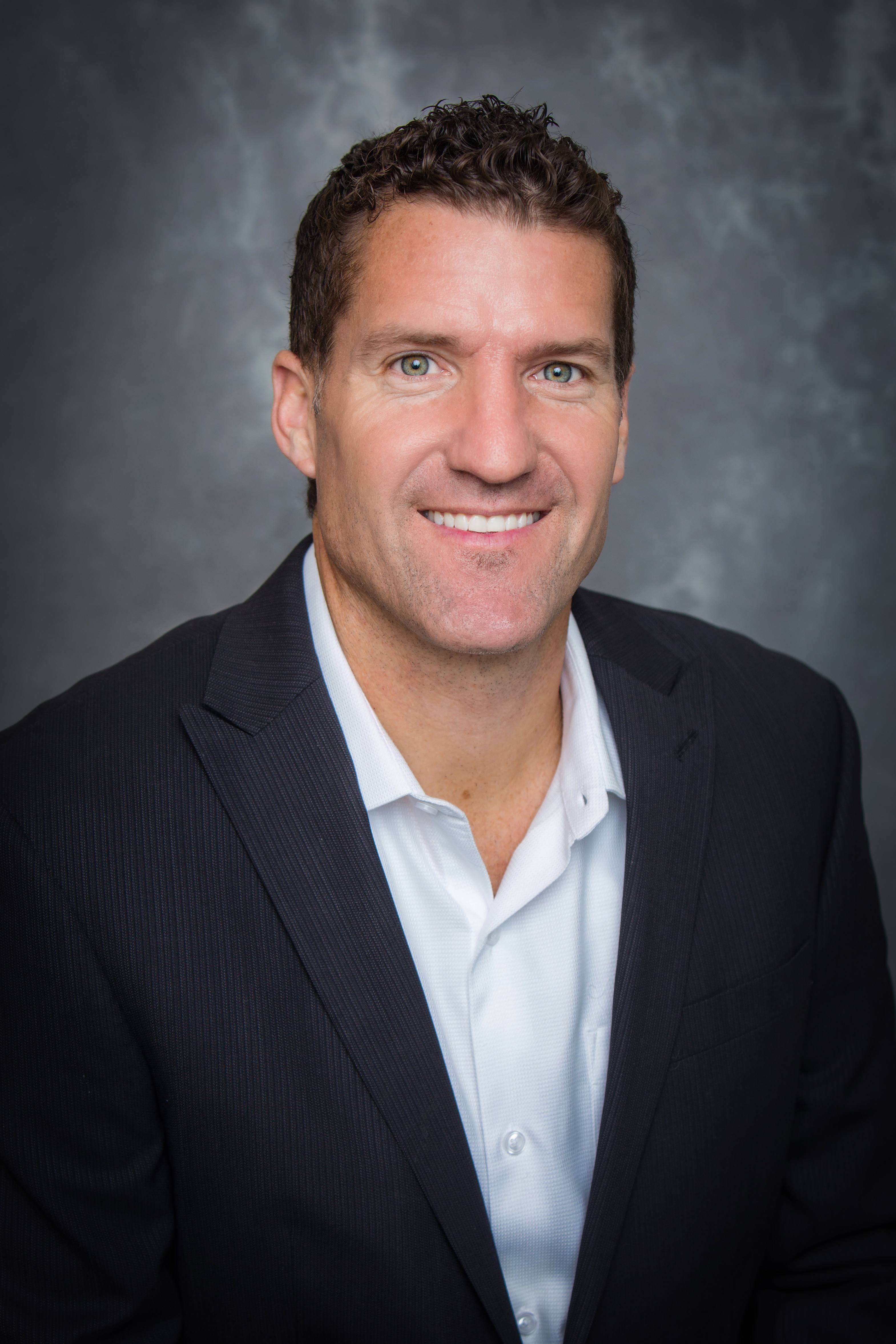
Chief Learning Officer
Andrew Shean is the Chief Learning Officer at Penn Foster Group, where he leads academic programming, curriculum, courseware, operations, and support in pursuit of improving student lives. He also serves on the Artificial Intelligence Advisory Council to Anthology. Among other roles, Shean has previously co-led the Institute for Engaged Leadership in Online Education through Penn State World Campus, in partnership with Online Learning Consortium.










